- Home
- Carolyn Keene
False Pretences Page 8
False Pretences Read online
Page 8
“I still think Fortunato’s the murderer,” Bess declared. “Why else was he hanging around the night of the murder? And what about that car that nearly ran you down? You don’t really believe it was being driven by a little old lady, do you?”
“No,” Nancy said, laughing. “But I can ask her when I see her.” She phoned the nursing home and learned that visitors were permitted that afternoon, beginning in half an hour.
“Do you want me to come along?” Bess asked.
“I don’t think so,” Nancy replied. “We might have trouble getting more than one person in to see her, and a crowd might make her nervous.”
“Okay, then I’m going to run a few errands,” Bess said. “Kyle, as soon as you can get away from the office, why don’t we take another look at Fortunato’s wrecking yard? I’m sure he’s hiding something.”
• • •
Crestwood Manor was a former private mansion set amid acres of lawns and gardens. Nancy parked and went in the front door. When she told the man at the desk that she was the daughter of Mrs. Carlisle’s attorney, he telephoned, then said that Mrs. Carlisle would meet her in the solarium.
Nancy followed his directions to a room with many tall windows and cheerful wicker furniture. Mrs. Carlisle, a short, plump woman with thinning white hair and cool, shrewd eyes, was already there, seated in a wicker armchair. She was grasping a slender wooden cane with a silver head in the form of a bird.
“You’re Carson Drew’s daughter, are you?” she began. “I suppose he’s too busy to come speak to me himself. Well, girl, what is it? What do you want?”
“I understand my dad’s firm drafted your will,” Nancy said.
The woman’s eyes narrowed. “Of course they did,” she snapped. “And charged handsomely for the job, too! What of it?”
“Do you know where that will is now?”
“Don’t you know?” Mrs. Carlisle asked. “It’s supposed to be with my other papers at your daddy’s office. Are you trying to tell me that it’s not there?”
“Well . . .”
The woman banged her cane on the floor. Her voice rose, nearly to a shout. “They got to you, didn’t they? They still think they’re going to lay their filthy murdering hands on my money! Well, I may be an old woman, but I still have a few surprises for them!”
“Mrs. Carlisle,” Nancy started to say, “I just—”
“And for you and your father, too!” Mrs. Carlisle pushed herself up out of the chair and tottered on her feet. Thinking she was about to fall, Nancy took a step toward her. Just then, the elderly woman raised her cane in the air and brought it down toward Nancy’s head.
Chapter
Twelve
NANCY THREW HERSELF to the right as the cane whistled toward her. It missed, but Nancy felt the breeze as the cane went by. An instant later it crashed against the arm of the wicker chair.
As Mrs. Carlisle raised the cane for another try, Nancy backed toward the door. Before she got there, it opened and a man came in.
“Is there a problem here?” he asked, going up to Mrs. Carlisle.
“Charles! Throw this young woman out— right now! And don’t let her come back!”
“You shouldn’t excite yourself, Mrs. Carlisle,” Charles murmured. “Would you like me to call down for a cup of herb tea?”
“Get her out of here!” She pointed her cane at the door, narrowly missing his head.
Charles turned to Nancy. “I’m sorry, miss,” he said politely but firmly, “I’m afraid you’d better leave. This way, please.”
As she followed him into the front hall, Nancy said, “I’m sorry I upset her. I didn’t mean to. Maybe if I came back another time—”
“I’m afraid that won’t be possible,” Charles said. He opened the front door and held it for her. “Our guests expect us to protect them from unwelcome visitors. If either you or your associate return, I’ll be forced to have you arrested for trespassing.”
“Associate?” Nancy said, turning back. “But I don’t—”
She found that she was talking to a closed door. She knocked and rang the buzzer, but there was no response. Finally she gave up and went to her car. As she drove back downtown, she thought what a shame it was that Mrs. Carlisle had been so badly upset. Still, she had learned two important facts. First, Mrs. Carlisle was convinced that someone was after her money. And second, somebody else had recently shown an interest in the elderly woman. Nancy had a hunch that that somebody was involved in Broughton’s murder. How to track him down? That was the problem.
“Oh, Nancy!” Carla said when Nancy walked into the law firm’s reception area. “Your father asked me to make sure that you see him the moment you got back.”
When Nancy pushed open the door to her father’s office, she saw him sitting with his head in his hands. He lowered his hands and raised his eyes. She had never seen his face so drawn.
“The buzzards are circling,” he said. He tried to smile to take the edge off his comment, but the effort defeated him. He picked up a stack of pink message slips. “These are all from newspaper and TV reporters who want to interview me. I don’t think they’re calling to find out my views about the latest Supreme Court decision.”
The telephone buzzed. He picked it up, listened for a moment, then replaced it. “The police,” he said, rubbing his eyes. “They asked to see me again tomorrow morning at headquarters. At least they’re still asking.”
“Don’t worry, Dad,” Nancy said. She circled the desk and gave him a quick hug. “We’re a lot closer to solving this business.”
“I heard,” he said. “A missing will, eh? I wonder what the connection is to Broughton’s death. Was there really a burglar after all?”
Nancy quickly explained why that didn’t seem likely, then asked, “Do you remember anything about Mrs. Carlisle’s will?”
Carson shook his head. “I’m not even sure that I drafted it,” he said. “She was never a big client of the firm. I doubt if I met her more than two or three times over the years. I have a vague feeling that she planned to leave the bulk of her estate to various causes—birds, perhaps? Something like that.”
“Suppose we hadn’t discovered that the will was missing?” Nancy asked. “What would have happened when she passed on?”
“We would have hunted for the will and not found it,” Carson replied. “In that case, the laws are very clear. The estate would go to her nearest living relative, whoever that might be.”
“I didn’t see any mention of relatives in her file,” Nancy observed.
“She may not have any. If none come forward, after a waiting period, the state takes over the property—unless, of course, someone can prove to the court that she intended to leave it to him or her.”
“I just know that Mrs. Carlisle is the key to this,” Nancy declared. “But how? Did Broughton steal her will? Or was it his killer? And in either case, why? Are you sure you can’t tell me anything more about her?”
Carson raised his palms in a gesture of helplessness. “I’m sorry, Nancy,” he said. “As I told you, I doubt if I met the lady more than two or three times. I know she had the reputation of being a very shrewd businesswoman, and I seem to recall some story about a tragedy in her past, but that’s it.”
Suddenly alert, Nancy asked, “What sort of tragedy?”
“An accident of some sort. I don’t recall.”
“Hmm—I wonder if whatever it was made the newspapers?” Nancy mused.
She was about to ask about Jack Broughton’s job references when there was a tap on the door. Ms. Hanson put her head in. “Oh, Nancy,” she said. “There’s a call for you on three from a David Megali.”
“Finally!” Nancy said. “Thanks, Ms. Hanson. Can I take it at your desk? Dad, I’ll catch you later.”
She hurried out and picked up the phone. “Hi, Nancy,” David said. “I got your messages today, but I’ve been running around like crazy.”
“That’s okay,” Nancy replied. “How did you track me d
own?”
He laughed. “I called your house, and the woman I spoke to told me to try your father’s office. Simple, huh? So, have you found out anything new?”
“I certainly have,” Nancy replied. “And it may tie in to your investigation, too.”
She told him a little about Mrs. Carlisle, though she didn’t mention the missing will. When she finished, he said, “Crestwood Manor? I’ve heard of it, of course. Very upscale, very comfortable. And very profitable, too, I bet. But none of my sources has mentioned it in connection with the kind of abuses I’m researching. I don’t recall the name Carlisle, either.”
“Oh. Too bad,” Nancy said. The disappointment she felt took her by surprise. Had she really expected David to solve the case for her?
“I couldn’t get anything more on who spread the rumors about your father,” David continued. “I have gathered a lot of other information. Some of it may help you solve your case. Why don’t we meet for dinner? I’ll lay it all out for you.”
Nancy’s spirits lifted. “Great,” she said. “But not at the Riverside. I really enjoyed our meal there, but it gave my car indigestion.”
He laughed. “Okay, then, I noticed a Middle Eastern restaurant not far from downtown,” he said. “How does seven o’clock sound?”
Nancy hesitated. “Can we make it a bit later?” she asked. “I need to go by the library first. I thought I might find some background information on Winona Carlisle in the newspaper files.”
“Sure, no problem,” David replied. They agreed on the place for eight o’clock and hung up.
After the call from David, Nancy found herself oddly troubled. She tried to calm down by checking over her notes on the case, but it didn’t work. She kept finding herself staring blankly into space.
It was time for drastic measures. She reached for the telephone and dialed Ned Nickerson’s number. The rush of happiness she felt when he answered told her that this was the right prescription for what was bothering her.
“Hi, Nancy,” Ned said. “I was going to call you tonight. What’s all this about somebody being killed in your father’s office? I saw a story on the news last night. Are you on the case?”
“Yes. I tried to call you earlier, but it’s been hectic around here,” Nancy said. She quickly filled him in on her investigation. Each time she mentioned David’s name she sensed herself stumbling a little. Ned apparently noticed.
“Tell me again who this guy David is,” he said when she finished. “He’s a reporter? For what paper?”
“He’s not a reporter, he’s a free-lance journalist,” Nancy replied. “He’s written for a lot of important magazines.”
“Yeah? That’s nice,” Ned said dryly. “River Heights must really feel like the sticks to him, then. How long is he planning to hang around?”
Nancy hesitated. It hadn’t sunk in that David was in town for just a limited time. “I don’t know—until he collects the information he needs for his article, I guess. Why?”
“I was wondering how many more dinners you’re planning to have with him,” Ned said. “Tonight’ll make two in a row.”
“Why, Nickerson, I think you’re jealous!” Nancy said with a giggle. “You should know better. You’re the one I love. But David is an experienced investigator, and I think he can help me with this case. And he is pretty cute,” she added, teasing Ned.
“He’d better keep his distance, or he won’t be so cute when I’m done with him,” Ned growled. “You take care of yourself, do you hear? Someone out there is a killer, and he’s already made at least one try for you.”
“I’ll be careful,” Nancy promised. She was about to say more when the telephone buzzed. “Hold on a sec,” she said, and pressed the intercom button.
“Is that Nancy?” Carla said. “You’ve got a call on two. She said it’s urgent.”
Nancy switched back to Ned and told him goodbye, then pressed the blinking button for the other line and said, “Hello?”
“Nancy?” Bess said urgently. “Listen, we’re at the junkyard—I mean near the junkyard, down the street—and I think we’ve spotted the car that tried to run you over today at the diner. You’ve got to come over here—right away!”
Chapter
Thirteen
AS NANCY DROVE out Henderson Road toward Al Fortunato’s wrecking yard, she asked herself why she wasn’t more excited about the discovery Bess and Kyle had apparently made. Was it because she didn’t want Fortunato to be the killer? Or simply that the net of dues was drawing tighter, and she didn’t think Fortunato was secured yet?
As arranged, Bess and Kyle were waiting in Bess’s car in the parking lot of the frozen yogurt stand next to the wrecking yard. Nancy pulled in alongside them, got out, and went over to order a double cone, vanilla and strawberry. She wasn’t really hungry, but her sense of fairness told her that if they made use of the parking lot, they ought to buy something. When her cone came, she carried it over to Bess’s car and got in.
“I’m sure it’s the same car,” Bess said, almost bouncing up and down on the seat. “We almost missed it because it’s partly hidden behind the office trailer. That’s suspicious right there, if you ask me. Why hide a dumb old car unless you’re afraid somebody might see it?”
“What we call hiding it somebody else might call just getting it out of the way,” Kyle pointed out in a let’s-look-at-both-sides-of-the-question tone of voice. “We don’t know it’s the same car, and even if it is, what real evidence do we have to link it to Fortunato?”
“It’s in his yard, isn’t it?” Bess retorted impatiently. “That’s a link. And we’re not going to find out if it’s the same car by sitting here, yakking and eating yogurt. We have to go check it out.”
“Fortunato won’t be very happy to see us again,” Nancy said.
“What if I go in first?” Kyle offered. “If he’s there, I’ll start asking him a lot of questions about carburetors or something. He doesn’t know me, so he won’t suspect anything. And while he’s talking to me, you two can slip past and check out the car.”
“Good plan,” Nancy said.
They walked down the road to the big Fortune Salvage sign. Nancy and Bess waited, out of sight, while Kyle strolled into the wrecking yard. Through the hedge, Nancy could just glimpse him standing with another person who had to be Fortunato, Kyle gestured, and the two of them walked off to the left.
“Now!” Nancy muttered. She and Bess ran into the yard. “Which way?” Nancy asked, keeping her voice low.
“Over there,” Bess replied, pointing.
Just behind the office trailer was a familiar-looking battered blue sedan. The space on the trunk for a license plate was conspicuously empty and clean. Nancy hurried over, with Bess close behind. There were dents and scratches on the right rear fender that showed bright, unrusted metal under them. That meant they were very fresh. Nancy squatted down and examined the rear end of the car more closely.
“Aha!” she said triumphantly. With her thumb and forefinger, she plucked a fragment of greenish safety glass from the gap between the car and the bumper.
“I was right, this is the car!” Bess crowed.
“What are you girls doing there?” an angry voice demanded loudly. “Get away from that car!”
Nancy stood up and turned to face Al Fortunato. Kyle was right behind him. “Is this your car?” she asked.
“It’s on my lot, isn’t it?” he retorted. “What business is it of yours?”
Bess jumped in. “That car nearly hit Nancy just a few hours ago. Not long after we left here, as a matter of fact.”
“Attempted homicide is very serious,” Kyle added.
Fortunato scowled at him. “You’re with them, are you?” he said. “I should have known. You talk pretty, but you don’t know beans about carburetors.”
He turned back to Nancy and said, “I can see right through your game. You think you can take up where your friend left off, do you? Well, think again. I worked hard for what I have. I’m not ab
out to hand it over to some thieving kid on account of some cock-and-bull story about being hit by a car. You look like you’re in pretty good shape to me,” he added.
“Mr. Fortunato,” Nancy began. “A couple of hours ago someone wearing a ski mask deliberately crashed this car into a phone booth while I was in it. I was lucky to escape without being seriously hurt.”
She pointed out the fresh dents and scratches, then showed him the piece of broken safety glass. Then she said, “This is the car that was used, and it belongs to you. Do you care to explain, or would you rather talk to the authorities?”
Fortunato shifted uneasily and said, “I don’t know anything about hitting a phone booth, and this isn’t my car, anyway.”
“It’s here on your lot,” Kyle pointed out.
“Yeah—well, what happens is this,” Fortunato replied. “Somebody’s got an old junker he wants to get rid of, but since he doesn’t want the hassle of transferring the title, he’ll park it outside my lot and take the plates off, then walk away from it. It happens all the time. So we just drag them inside the lot and try to make a few bucks off them.”
“Are you trying to tell us that this car was abandoned here this afternoon?” Bess demanded in a disbelieving tone.
“I’m not trying to, sweetie—I am,” he replied. “And I still think you’re trying to measure me for a frame. But get this, and get it right. I won’t play and I won’t pay. I told your buddy that, and now I’m telling you.”
“Mr. Fortunato,” Nancy said. “We have no intention of trying to frame you, or blackmail you, or anything else—really we don’t. All we want is a few facts. Was Jack Broughton trying to extort money from you?”

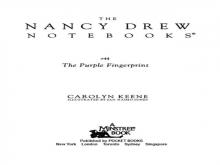 The Purple Fingerprint
The Purple Fingerprint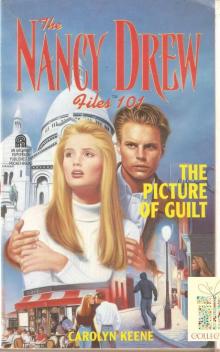 The Picture of Guilt
The Picture of Guilt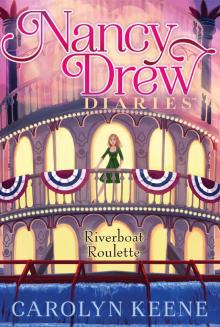 Riverboat Roulette
Riverboat Roulette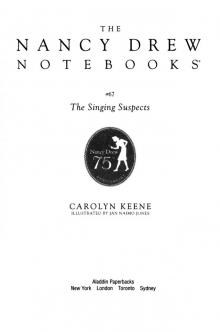 The Singing Suspects
The Singing Suspects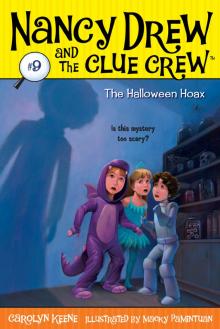 The Halloween Hoax
The Halloween Hoax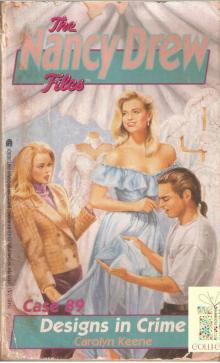 089 Designs in Crime
089 Designs in Crime The Hidden Treasures
The Hidden Treasures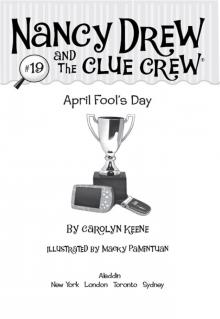 April Fool's Day
April Fool's Day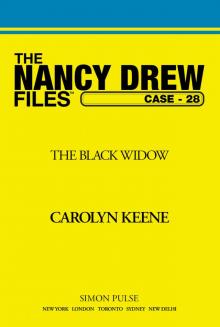 The Black Widow
The Black Widow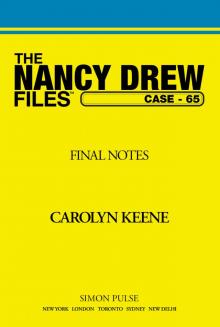 Final Notes
Final Notes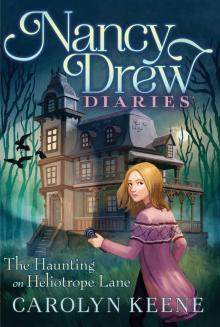 The Haunting on Heliotrope Lane
The Haunting on Heliotrope Lane The Runaway Bride
The Runaway Bride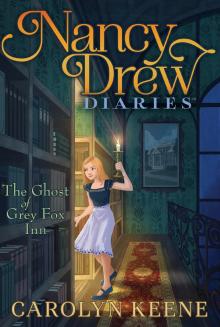 The Ghost of Grey Fox Inn
The Ghost of Grey Fox Inn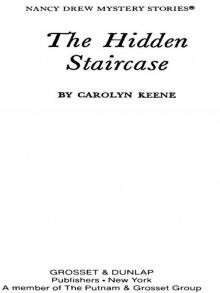 The Hidden Staircase
The Hidden Staircase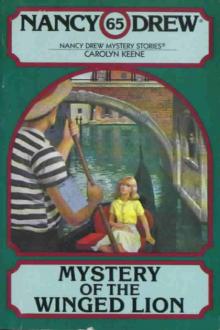 Mystery of the Winged Lion
Mystery of the Winged Lion Over the Edge
Over the Edge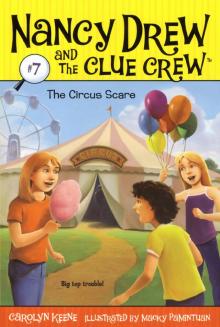 The Circus Scare
The Circus Scare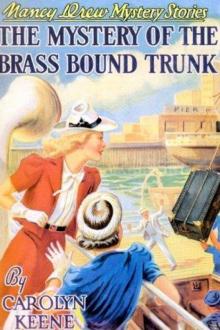 The Mystery of the Brass-Bound Trunk
The Mystery of the Brass-Bound Trunk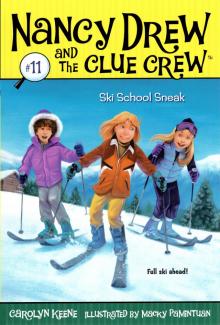 Ski School Sneak
Ski School Sneak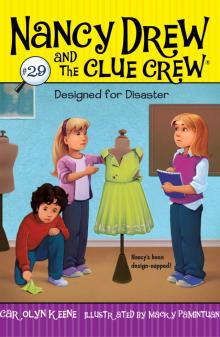 Designed for Disaster
Designed for Disaster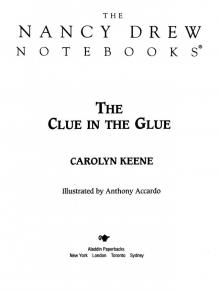 The Clue in the Glue
The Clue in the Glue Cold as Ice
Cold as Ice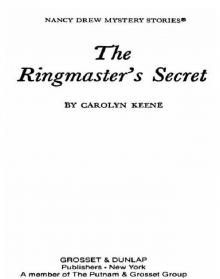 The Ringmaster's Secret
The Ringmaster's Secret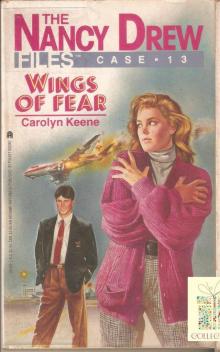 013 Wings of Fear
013 Wings of Fear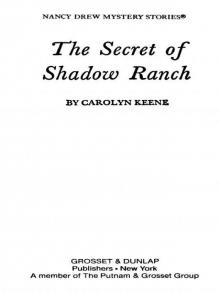 The Secret of Shadow Ranch
The Secret of Shadow Ranch Not Nice on Ice
Not Nice on Ice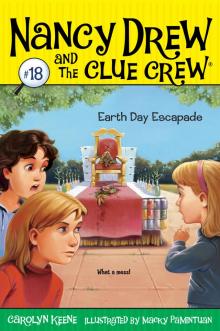 Earth Day Escapade
Earth Day Escapade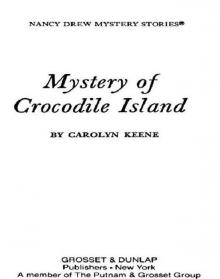 Mystery of Crocodile Island
Mystery of Crocodile Island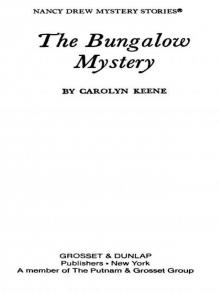 The Bungalow Mystery
The Bungalow Mystery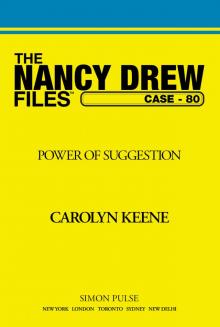 Power of Suggestion
Power of Suggestion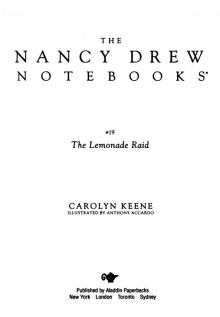 The Lemonade Raid
The Lemonade Raid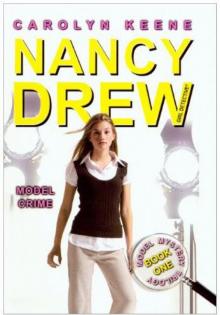 Model Crime
Model Crime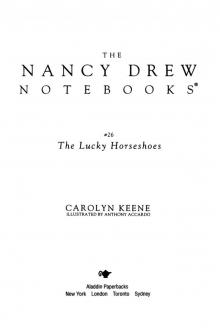 The Lucky Horseshoes
The Lucky Horseshoes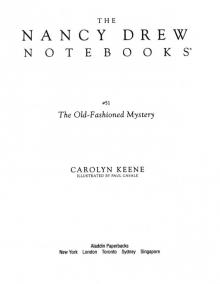 The Secret of the Old Clock
The Secret of the Old Clock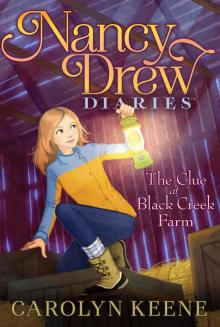 The Clue at Black Creek Farm
The Clue at Black Creek Farm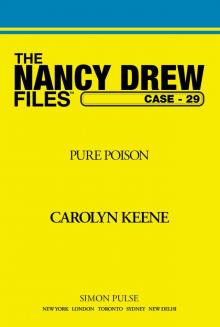 Pure Poison
Pure Poison Nobody's Business
Nobody's Business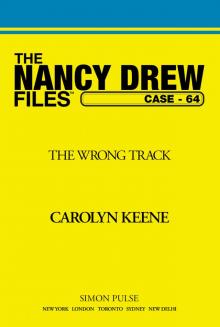 Wrong Track
Wrong Track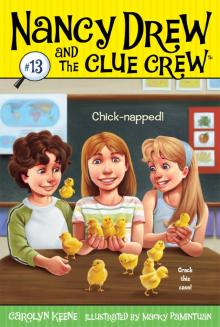 Chick-Napped!
Chick-Napped!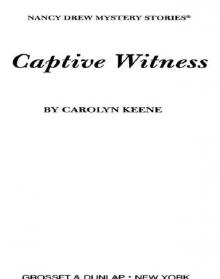 Captive Witness
Captive Witness If Looks Could Kill
If Looks Could Kill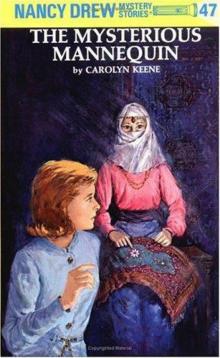 The Mysterious Mannequin
The Mysterious Mannequin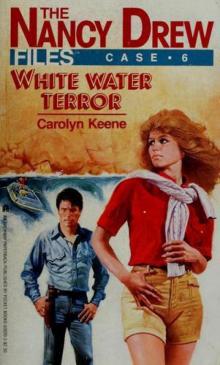 White Water Terror
White Water Terror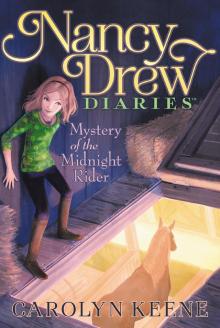 Mystery of the Midnight Rider
Mystery of the Midnight Rider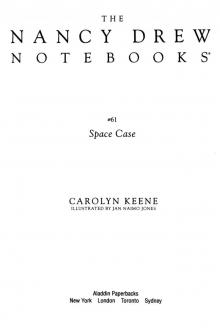 Space Case
Space Case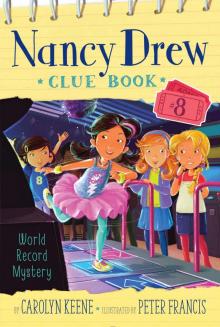 World Record Mystery
World Record Mystery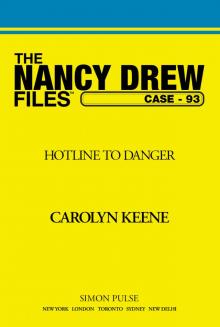 Hotline to Danger
Hotline to Danger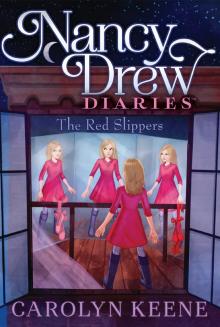 The Red Slippers
The Red Slippers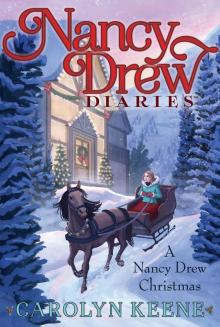 A Crime for Christmas
A Crime for Christmas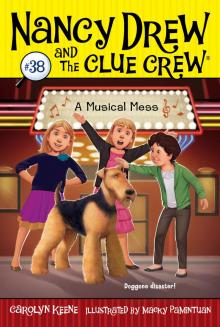 A Musical Mess
A Musical Mess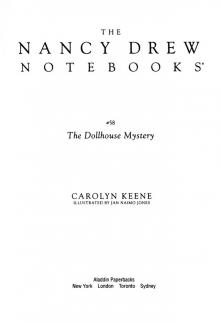 The Dollhouse Mystery
The Dollhouse Mystery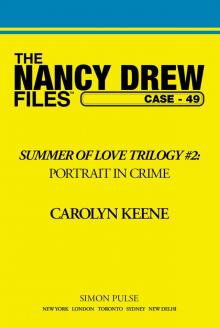 Portrait in Crime
Portrait in Crime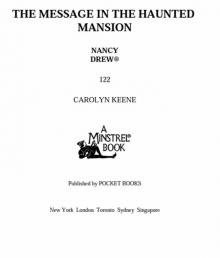 The Message in the Haunted Mansion
The Message in the Haunted Mansion Playing With Fire
Playing With Fire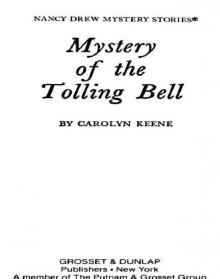 Mystery of the Tolling Bell
Mystery of the Tolling Bell Cutting Edge
Cutting Edge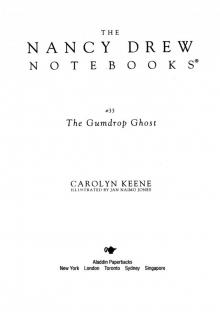 The Gumdrop Ghost
The Gumdrop Ghost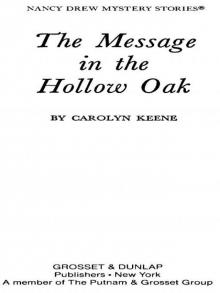 The Message in the Hollow Oak
The Message in the Hollow Oak Trial by Fire
Trial by Fire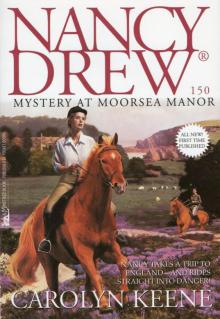 Mystery at Moorsea Manor
Mystery at Moorsea Manor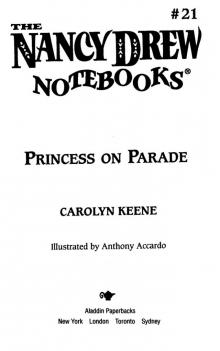 Princess on Parade
Princess on Parade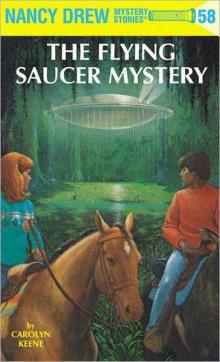 The Flying Saucer Mystery
The Flying Saucer Mystery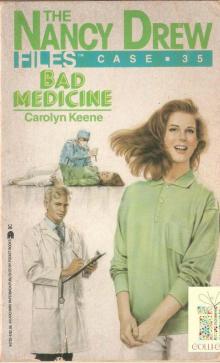 035 Bad Medicine
035 Bad Medicine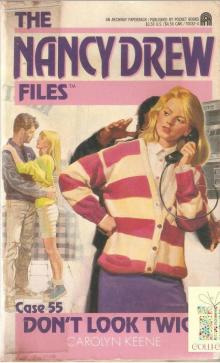 055 Don't Look Twice
055 Don't Look Twice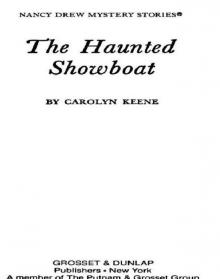 The Haunted Showboat
The Haunted Showboat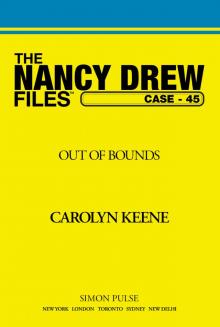 Out of Bounds
Out of Bounds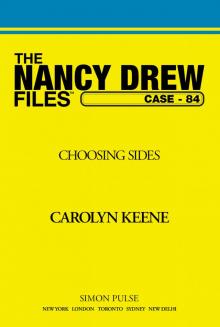 Choosing Sides
Choosing Sides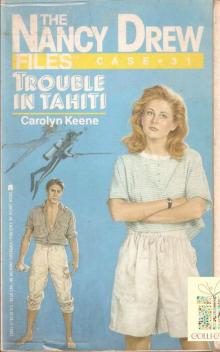 031 Trouble in Tahiti
031 Trouble in Tahiti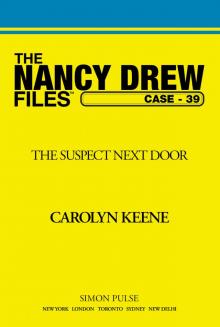 The Suspect Next Door
The Suspect Next Door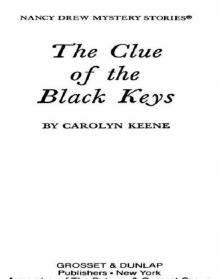 The Clue of the Black Keys
The Clue of the Black Keys The Secret Santa
The Secret Santa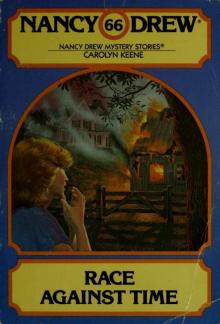 Race Against Time
Race Against Time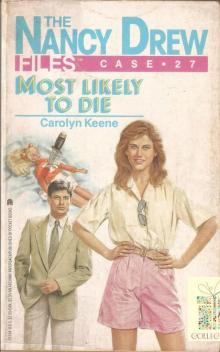 027 Most Likely to Die
027 Most Likely to Die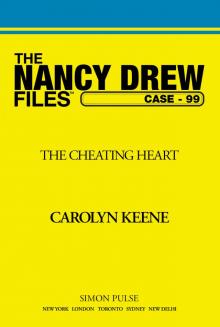 The Cheating Heart
The Cheating Heart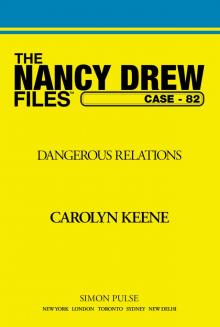 Dangerous Relations
Dangerous Relations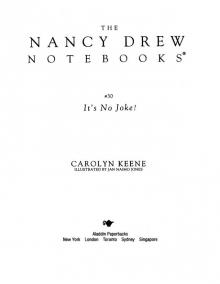 It's No Joke!
It's No Joke!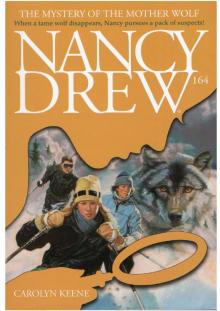 The Mystery of the Mother Wolf
The Mystery of the Mother Wolf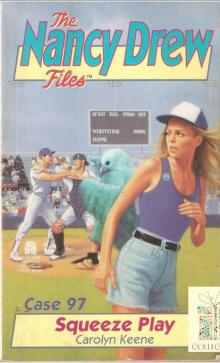 097 Squeeze Play
097 Squeeze Play Secret at Mystic Lake
Secret at Mystic Lake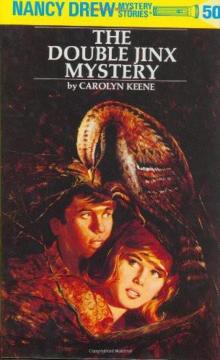 The Double Jinx Mystery
The Double Jinx Mystery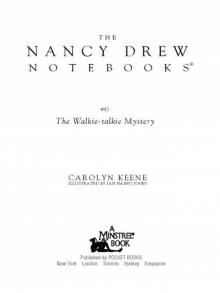 The Walkie Talkie Mystery
The Walkie Talkie Mystery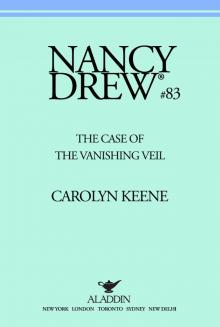 The Case of the Vanishing Veil
The Case of the Vanishing Veil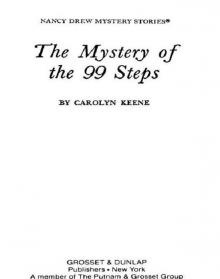 The Mystery of the 99 Steps
The Mystery of the 99 Steps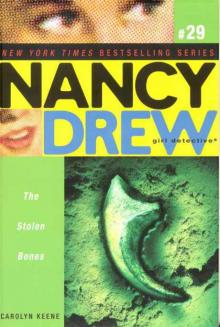 The Stolen Bones
The Stolen Bones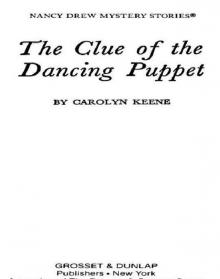 The Clue of the Dancing Puppet
The Clue of the Dancing Puppet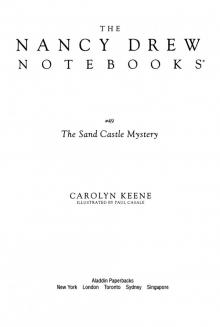 The Sand Castle Mystery
The Sand Castle Mystery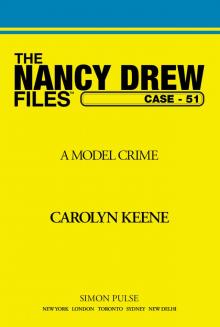 A Model Crime
A Model Crime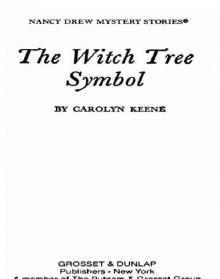 The Witch Tree Symbol
The Witch Tree Symbol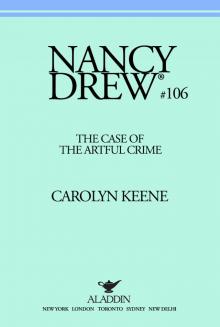 The Case of the Artful Crime
The Case of the Artful Crime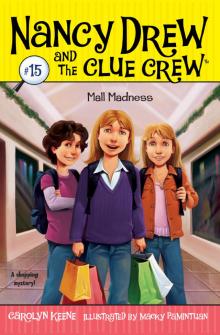 Mall Madness
Mall Madness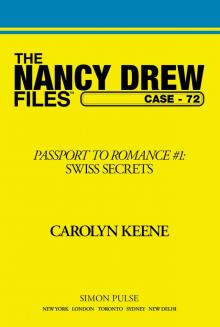 Swiss Secrets
Swiss Secrets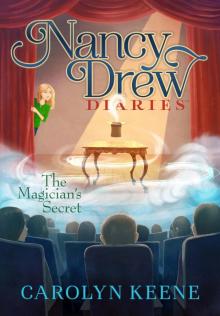 The Magician's Secret
The Magician's Secret Tall, Dark and Deadly
Tall, Dark and Deadly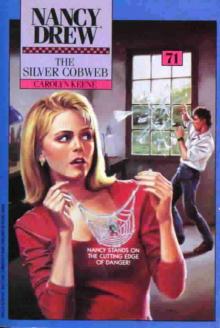 The Silver Cobweb
The Silver Cobweb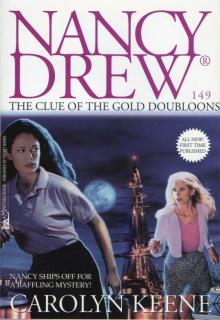 The Clue of the Gold Doubloons
The Clue of the Gold Doubloons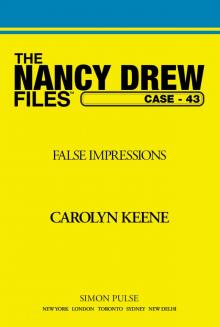 False Impressions
False Impressions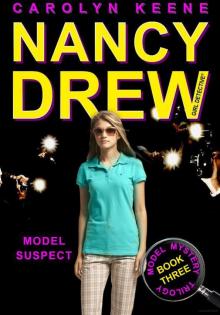 Model Suspect
Model Suspect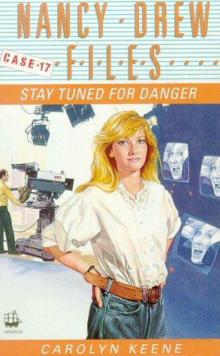 Stay Tuned for Danger
Stay Tuned for Danger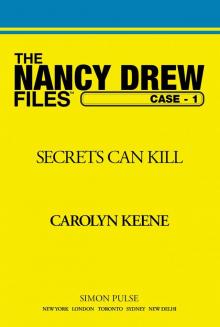 Secrets Can Kill
Secrets Can Kill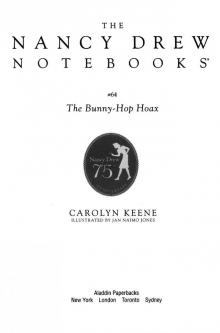 The Bunny-Hop Hoax
The Bunny-Hop Hoax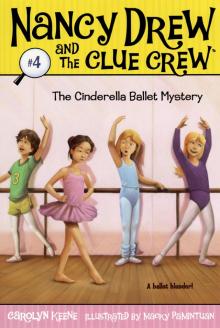 The Cinderella Ballet Mystery
The Cinderella Ballet Mystery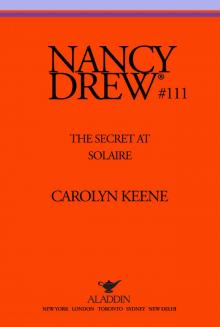 The Secret at Solaire
The Secret at Solaire Trash or Treasure?
Trash or Treasure?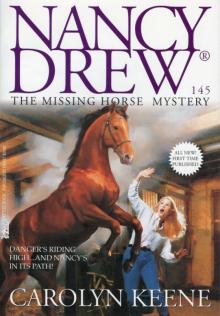 The Missing Horse Mystery
The Missing Horse Mystery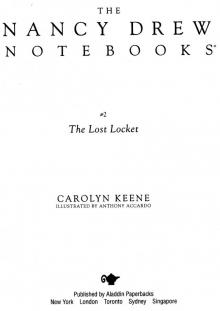 The Lost Locket
The Lost Locket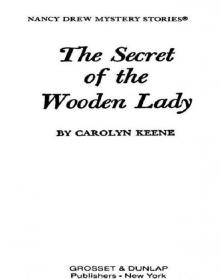 The Secret of the Wooden Lady
The Secret of the Wooden Lady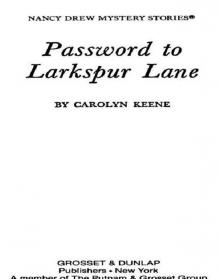 Password to Larkspur Lane
Password to Larkspur Lane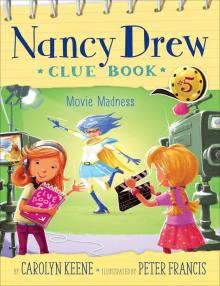 Movie Madness
Movie Madness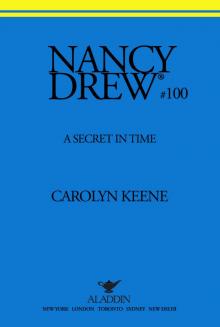 A Secret in Time
A Secret in Time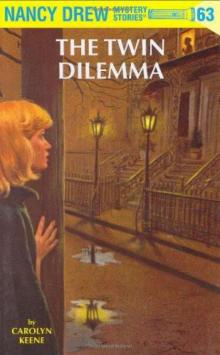 The Twin Dilemma
The Twin Dilemma Candy Is Dandy
Candy Is Dandy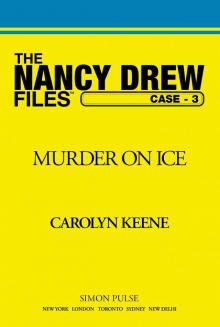 Murder on Ice
Murder on Ice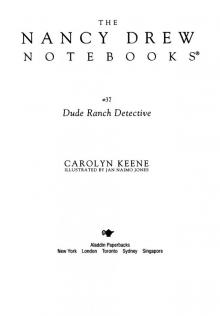 Dude Ranch Detective
Dude Ranch Detective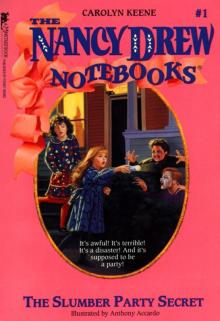 The Slumber Party Secret
The Slumber Party Secret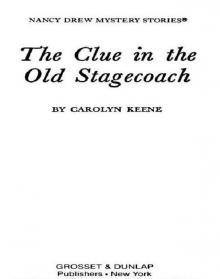 The Clue in the Old Stagecoach
The Clue in the Old Stagecoach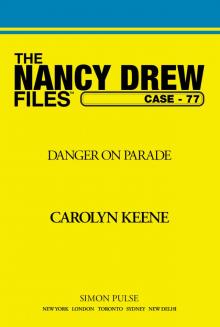 Danger on Parade
Danger on Parade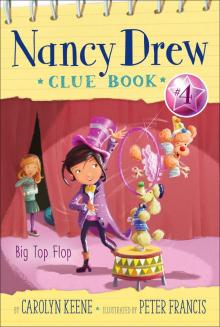 Big Top Flop
Big Top Flop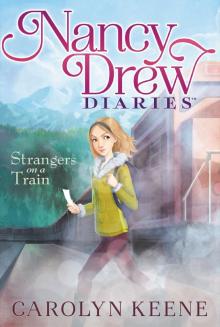 Strangers on a Train
Strangers on a Train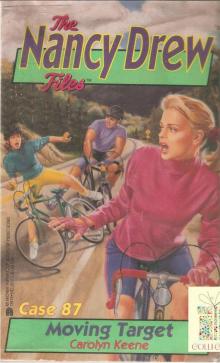 087 Moving Target
087 Moving Target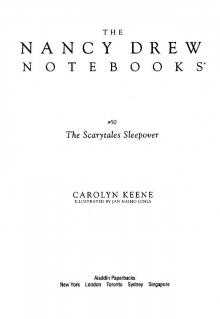 The Scarytales Sleepover
The Scarytales Sleepover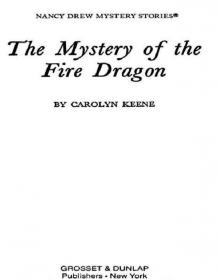 The Mystery of the Fire Dragon
The Mystery of the Fire Dragon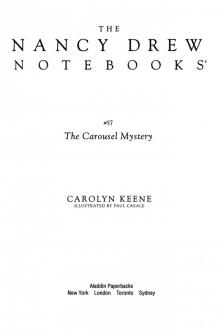 The Carousel Mystery
The Carousel Mystery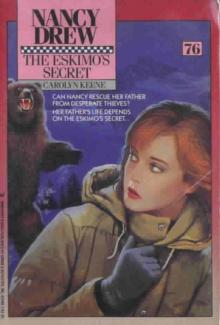 The Eskimo's Secret
The Eskimo's Secret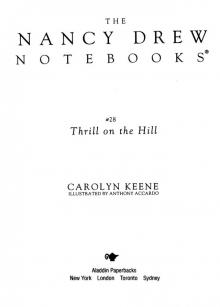 Thrill on the Hill
Thrill on the Hill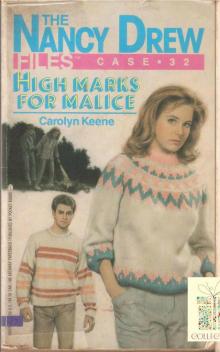 032 High Marks for Malice
032 High Marks for Malice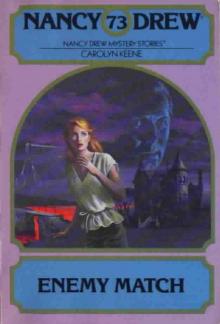 Enemy Match
Enemy Match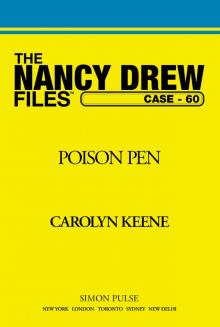 Poison Pen
Poison Pen Lights, Camera . . . Cats!
Lights, Camera . . . Cats!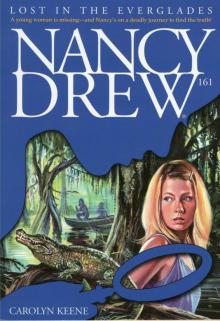 Lost in the Everglades
Lost in the Everglades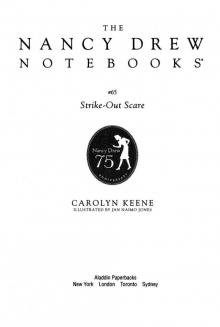 Strike-Out Scare
Strike-Out Scare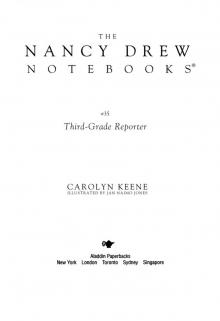 Third-Grade Reporter
Third-Grade Reporter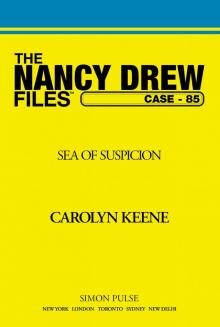 Sea of Suspicion
Sea of Suspicion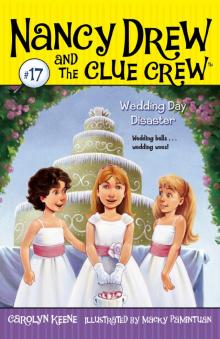 Wedding Day Disaster
Wedding Day Disaster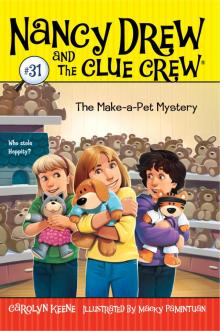 The Make-A-Pet Mystery
The Make-A-Pet Mystery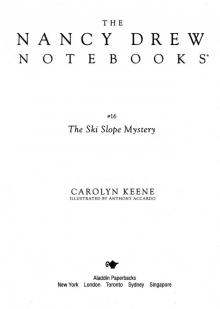 The Ski Slope Mystery
The Ski Slope Mystery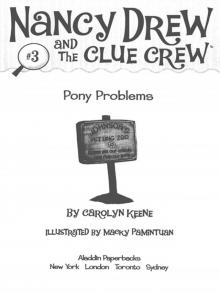 Pony Problems
Pony Problems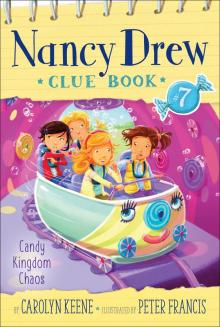 Candy Kingdom Chaos
Candy Kingdom Chaos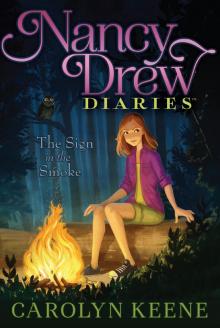 The Sign in the Smoke
The Sign in the Smoke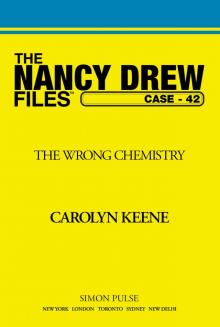 The Wrong Chemistry
The Wrong Chemistry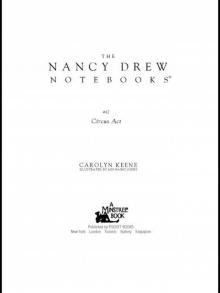 Circus Act
Circus Act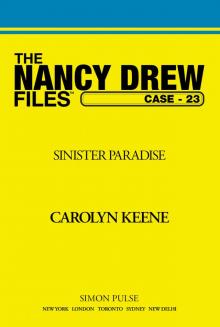 Sinister Paradise
Sinister Paradise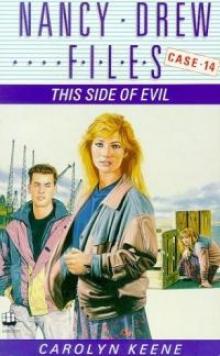 This Side of Evil
This Side of Evil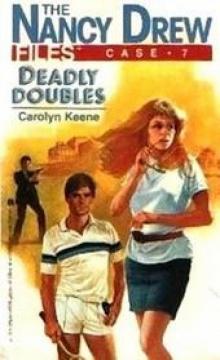 Deadly Doubles
Deadly Doubles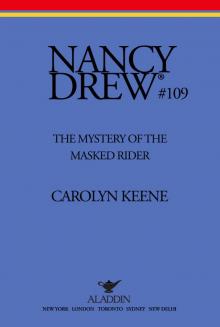 The Mystery of the Masked Rider
The Mystery of the Masked Rider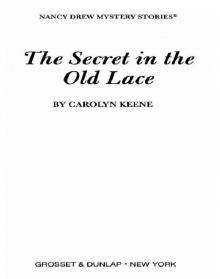 The Secret in the Old Lace
The Secret in the Old Lace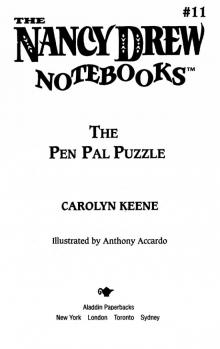 The Pen Pal Puzzle
The Pen Pal Puzzle Without a Trace
Without a Trace Whose Pet Is Best?
Whose Pet Is Best?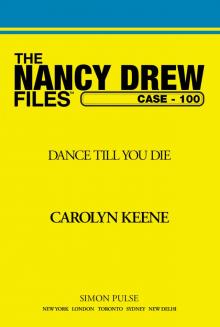 Dance Till You Die
Dance Till You Die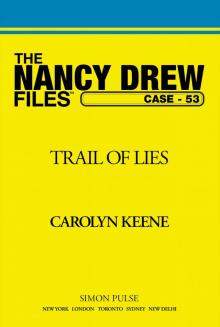 Trail of Lies
Trail of Lies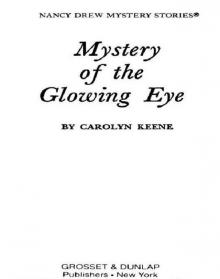 Mystery of the Glowing Eye
Mystery of the Glowing Eye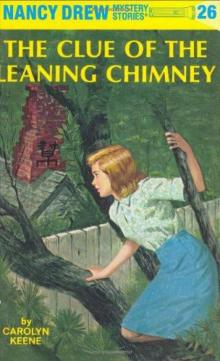 The Clue of the Leaning Chimney
The Clue of the Leaning Chimney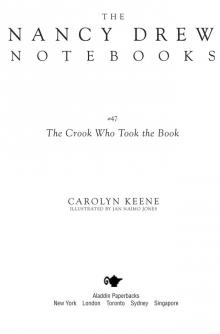 The Crook Who Took the Book
The Crook Who Took the Book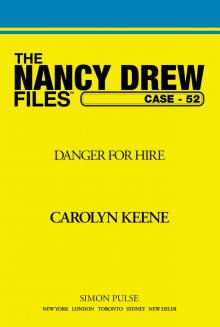 Danger for Hire
Danger for Hire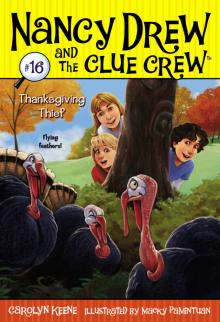 Thanksgiving Thief
Thanksgiving Thief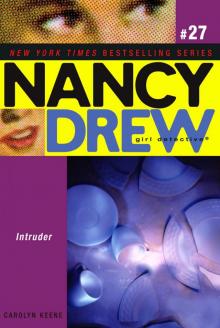 Intruder!
Intruder!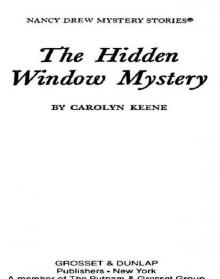 The Hidden Window Mystery
The Hidden Window Mystery Win, Place or Die
Win, Place or Die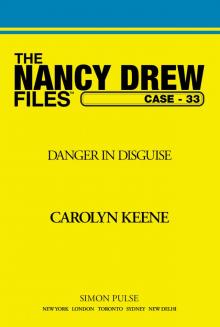 Danger in Disguise
Danger in Disguise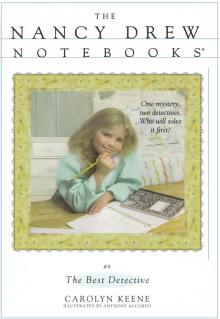 The Best Detective
The Best Detective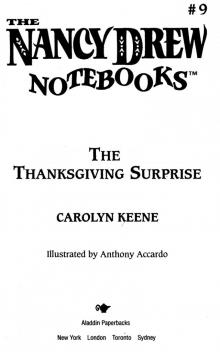 The Thanksgiving Surprise
The Thanksgiving Surprise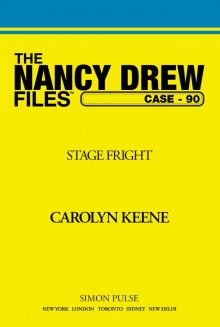 Stage Fright
Stage Fright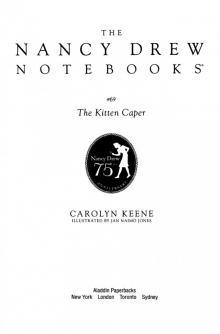 The Kitten Caper
The Kitten Caper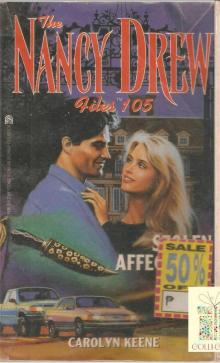 Stolen Affections
Stolen Affections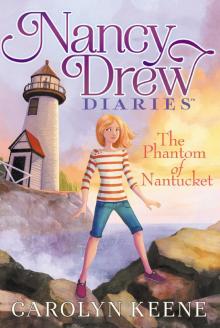 The Phantom of Nantucket
The Phantom of Nantucket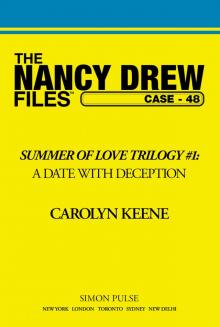 Date With Deception
Date With Deception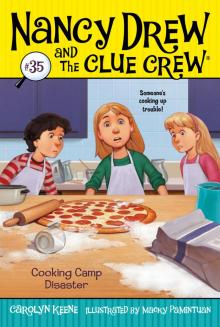 Cooking Camp Disaster
Cooking Camp Disaster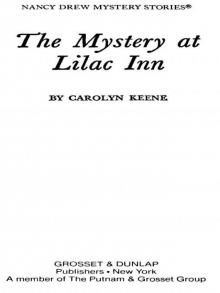 The Mystery at Lilac Inn
The Mystery at Lilac Inn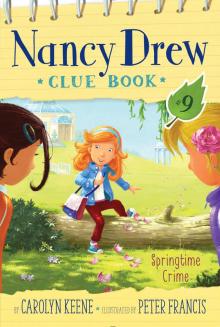 Springtime Crime
Springtime Crime Action!
Action! Into Thin Air
Into Thin Air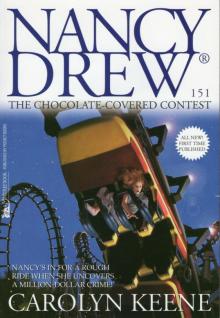 The Chocolate-Covered Contest
The Chocolate-Covered Contest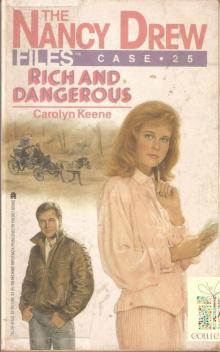 025 Rich and Dangerous
025 Rich and Dangerous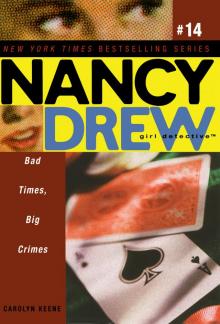 Bad Times, Big Crimes
Bad Times, Big Crimes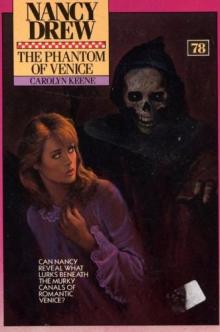 078 The Phantom Of Venice
078 The Phantom Of Venice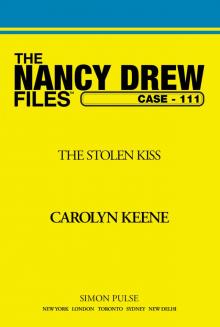 The Stolen Kiss
The Stolen Kiss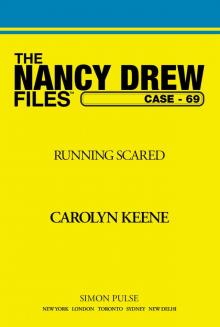 Running Scared
Running Scared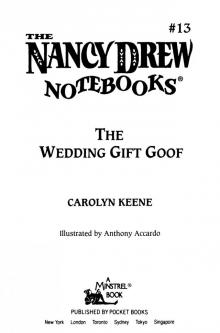 The Wedding Gift Goof
The Wedding Gift Goof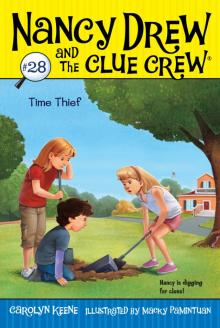 Time Thief
Time Thief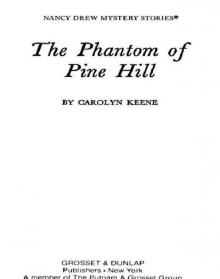 The Phantom of Pine Hill
The Phantom of Pine Hill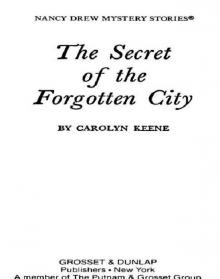 The Secret of the Forgotten City
The Secret of the Forgotten City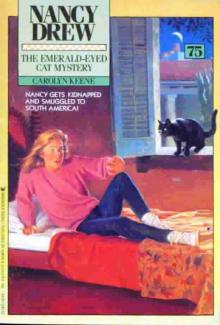 The Emerald-Eyed Cat Mystery
The Emerald-Eyed Cat Mystery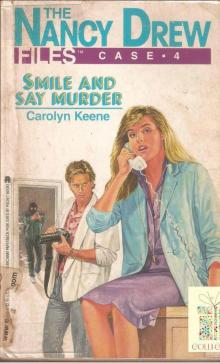 004 Smile and Say Murder
004 Smile and Say Murder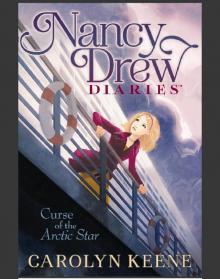 Curse of the Arctic Star
Curse of the Arctic Star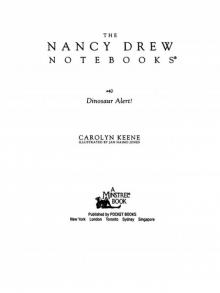 Dinosaur Alert!
Dinosaur Alert!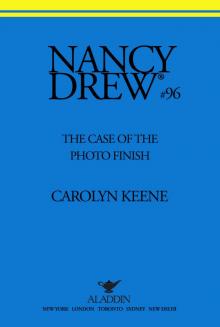 The Case of the Photo Finish
The Case of the Photo Finish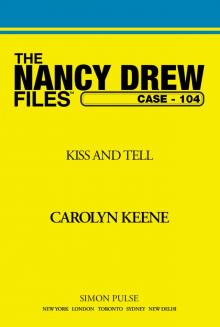 Kiss and Tell
Kiss and Tell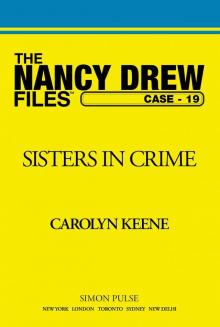 Sisters in Crime
Sisters in Crime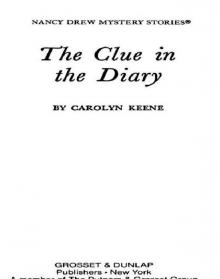 The Clue in the Diary
The Clue in the Diary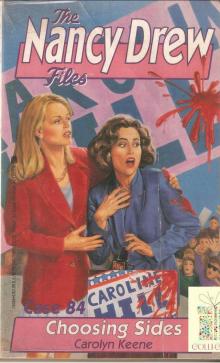 084 Choosing Sides
084 Choosing Sides Haunting of Horse Island
Haunting of Horse Island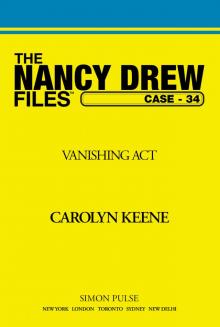 Vanishing Act
Vanishing Act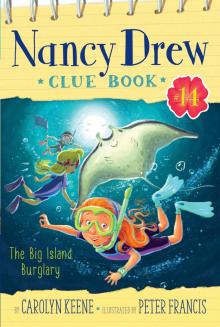 The Big Island Burglary
The Big Island Burglary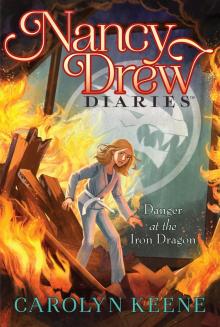 Danger at the Iron Dragon
Danger at the Iron Dragon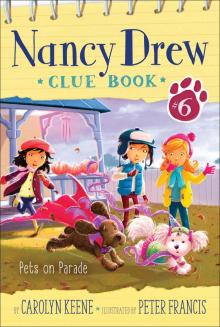 Pets on Parade
Pets on Parade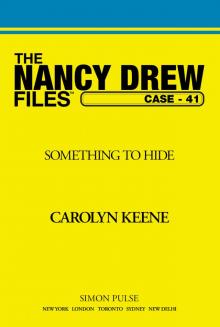 Something to Hide
Something to Hide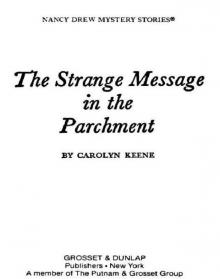 The Strange Message in the Parchment
The Strange Message in the Parchment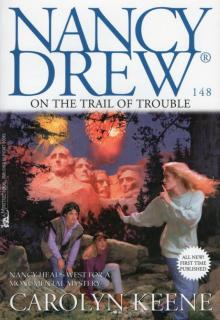 On the Trail of Trouble
On the Trail of Trouble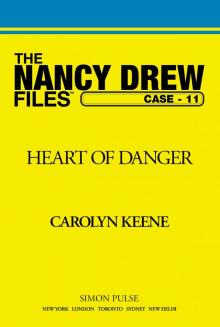 Heart of Danger
Heart of Danger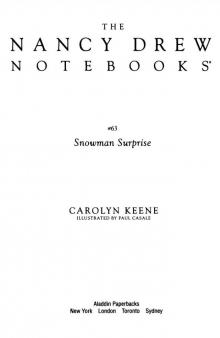 The Snowman Surprise
The Snowman Surprise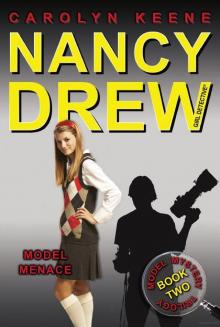 Model Menace
Model Menace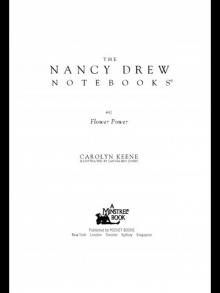 Flower Power
Flower Power The Great Goat Gaffe
The Great Goat Gaffe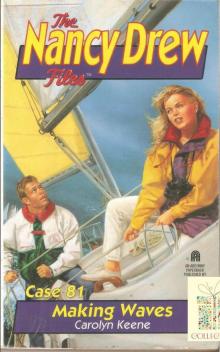 081 Making Waves
081 Making Waves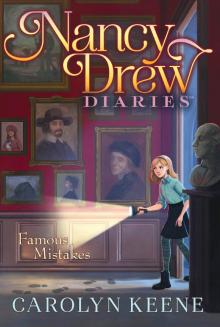 Famous Mistakes
Famous Mistakes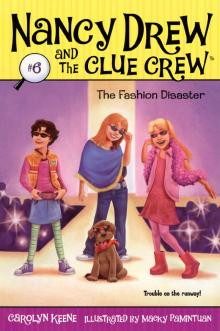 The Fashion Disaster
The Fashion Disaster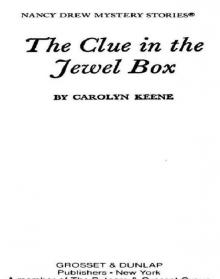 The Clue in the Jewel Box
The Clue in the Jewel Box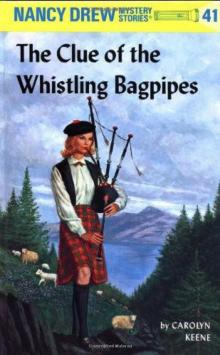 The Clue of the Whistling Bagpipes
The Clue of the Whistling Bagpipes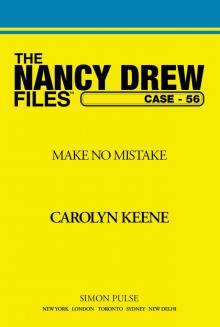 Make No Mistake
Make No Mistake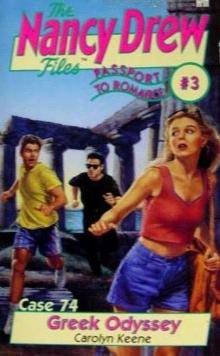 Greek Odyssey
Greek Odyssey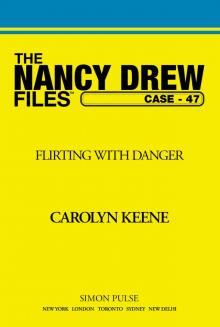 Flirting With Danger
Flirting With Danger Double Take
Double Take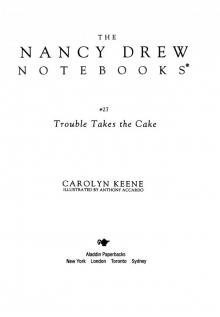 Trouble Takes the Cake
Trouble Takes the Cake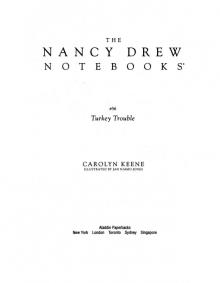 Turkey Trouble
Turkey Trouble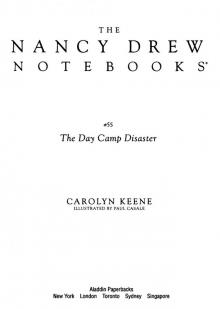 The Day Camp Disaster
The Day Camp Disaster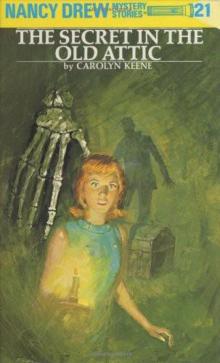 The Secret in the Old Attic
The Secret in the Old Attic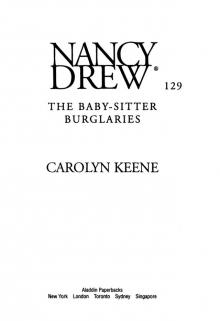 The Baby-Sitter Burglaries
The Baby-Sitter Burglaries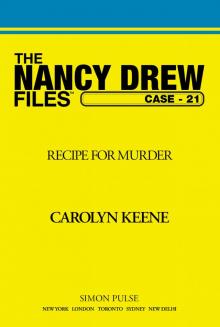 Recipe for Murder
Recipe for Murder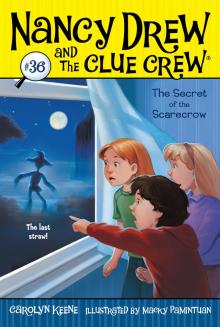 The Secret of the Scarecrow
The Secret of the Scarecrow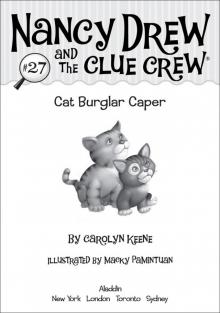 Cat Burglar Caper
Cat Burglar Caper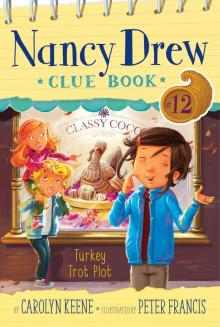 Turkey Trot Plot
Turkey Trot Plot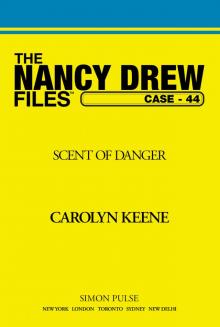 Scent of Danger
Scent of Danger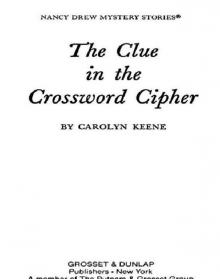 The Clue in the Crossword Cipher
The Clue in the Crossword Cipher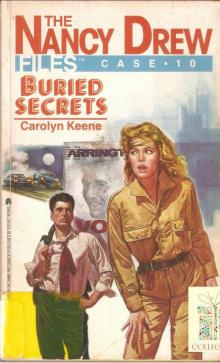 010 Buried Secrets
010 Buried Secrets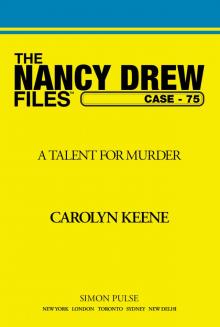 A Talent for Murder
A Talent for Murder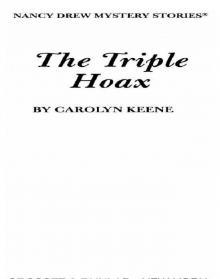 The Triple Hoax
The Triple Hoax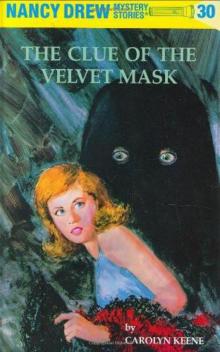 The Clue of the Velvet Mask
The Clue of the Velvet Mask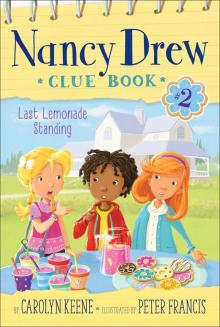 Last Lemonade Standing
Last Lemonade Standing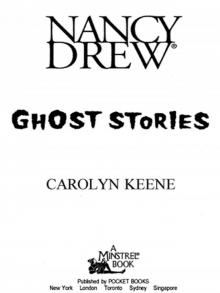 The Ghost of Blackwood Hall
The Ghost of Blackwood Hall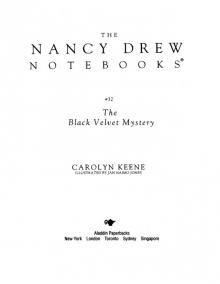 The Black Velvet Mystery
The Black Velvet Mystery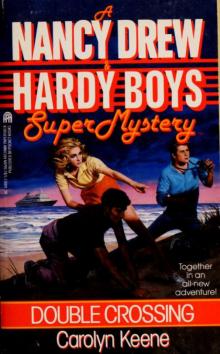 Double Crossing
Double Crossing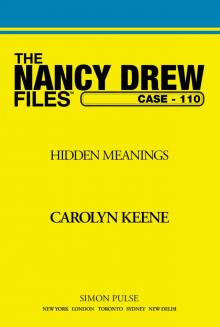 Hidden Meanings
Hidden Meanings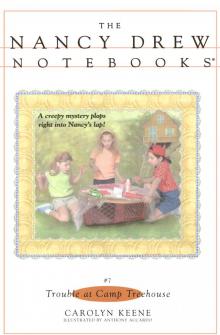 Trouble at Camp Treehouse
Trouble at Camp Treehouse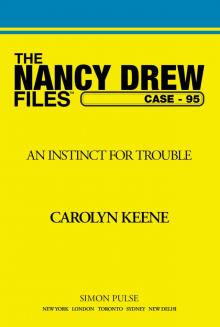 An Instinct for Trouble
An Instinct for Trouble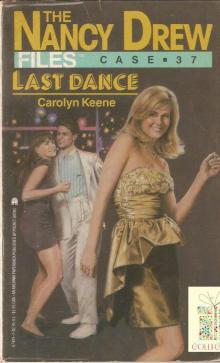 037 Last Dance
037 Last Dance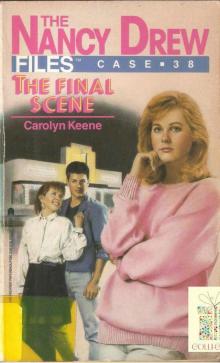 038 The Final Scene
038 The Final Scene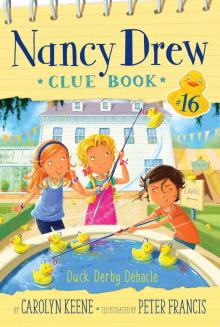 Duck Derby Debacle
Duck Derby Debacle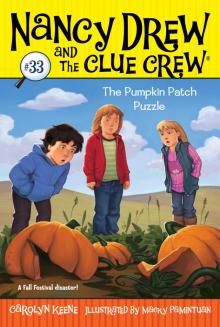 The Pumpkin Patch Puzzle
The Pumpkin Patch Puzzle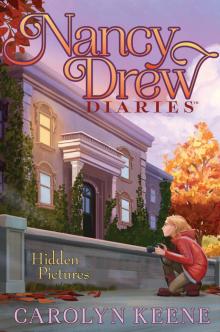 Hidden Pictures
Hidden Pictures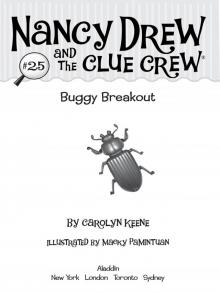 Buggy Breakout
Buggy Breakout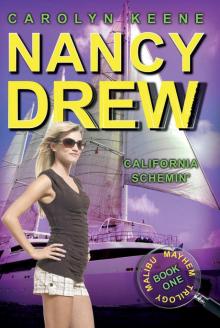 California Schemin'
California Schemin'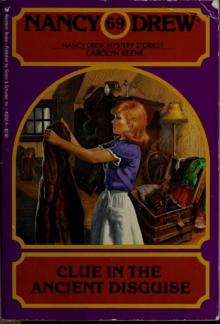 Clue in the Ancient Disguise
Clue in the Ancient Disguise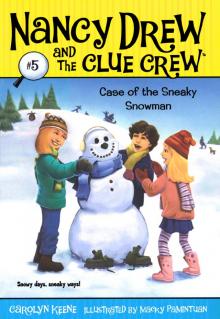 Case of the Sneaky Snowman
Case of the Sneaky Snowman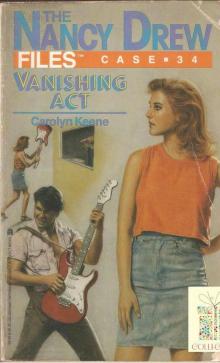 034 Vanishing Act
034 Vanishing Act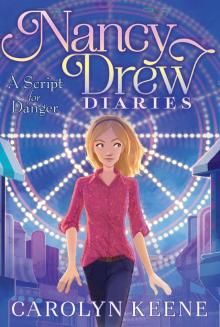 A Script for Danger
A Script for Danger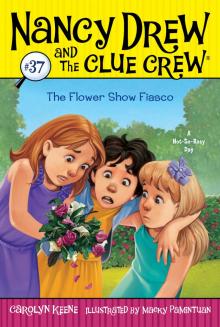 The Flower Show Fiasco
The Flower Show Fiasco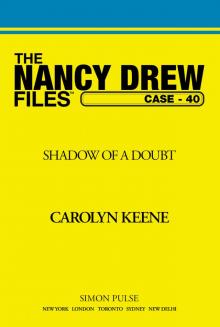 Shadow of a Doubt
Shadow of a Doubt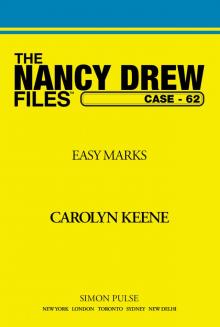 Easy Marks
Easy Marks Alien in the Classroom
Alien in the Classroom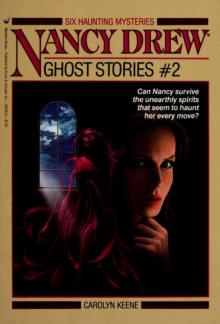 Ghost Stories, #2 (Nancy Drew)
Ghost Stories, #2 (Nancy Drew)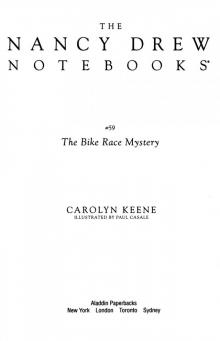 The Bike Race Mystery
The Bike Race Mystery False Pretenses
False Pretenses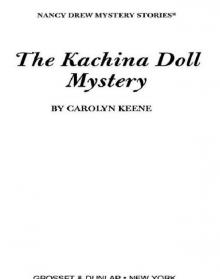 The Kachina Doll Mystery
The Kachina Doll Mystery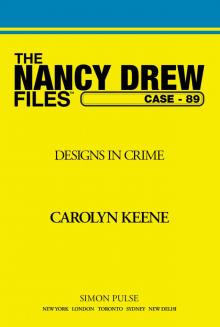 Designs in Crime
Designs in Crime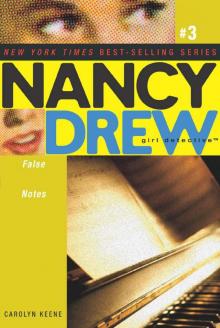 False Notes
False Notes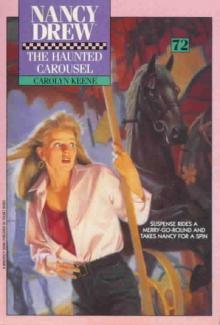 The Haunted Carousel
The Haunted Carousel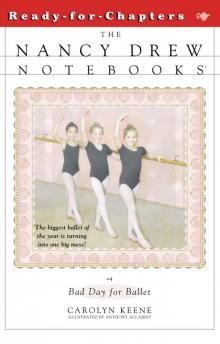 Bad Day for Ballet
Bad Day for Ballet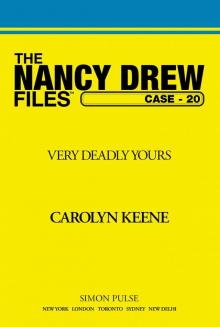 Very Deadly Yours
Very Deadly Yours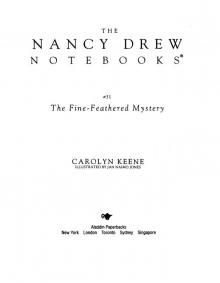 The Fine-Feathered Mystery
The Fine-Feathered Mystery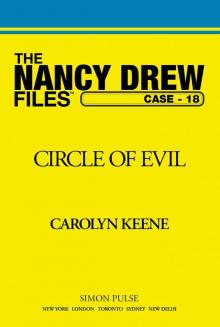 Circle of Evil
Circle of Evil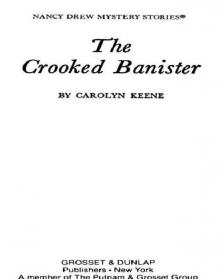 The Crooked Banister
The Crooked Banister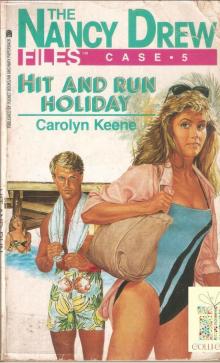 005 Hit and Run Holiday
005 Hit and Run Holiday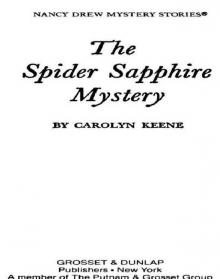 The Spider Sapphire Mystery
The Spider Sapphire Mystery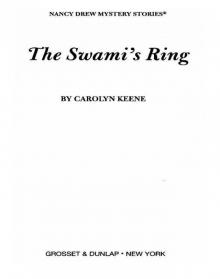 The Swami's Ring
The Swami's Ring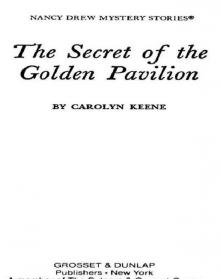 The Secret of the Golden Pavilion
The Secret of the Golden Pavilion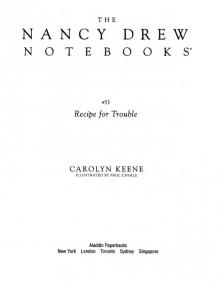 Recipe for Trouble
Recipe for Trouble Betrayed by Love
Betrayed by Love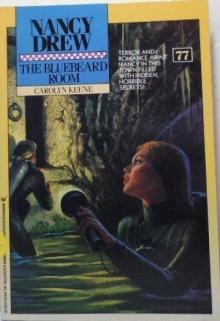 The Bluebeard Room
The Bluebeard Room Sweet Revenge
Sweet Revenge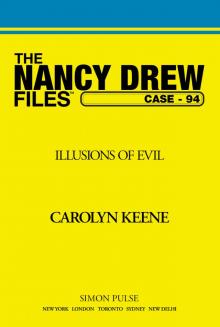 Illusions of Evil
Illusions of Evil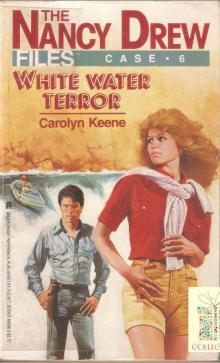 006 White Water Terror
006 White Water Terror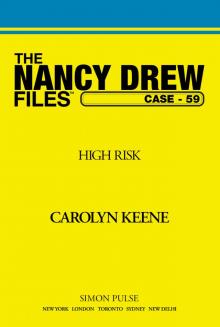 High Risk
High Risk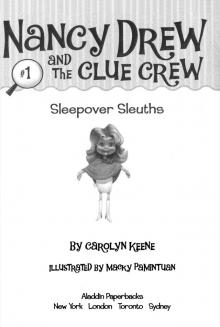 Sleepover Sleuths
Sleepover Sleuths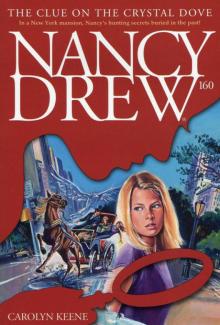 The Clue on the Crystal Dove
The Clue on the Crystal Dove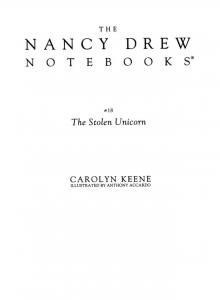 The Stolen Unicorn
The Stolen Unicorn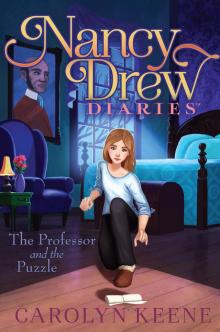 The Professor and the Puzzle
The Professor and the Puzzle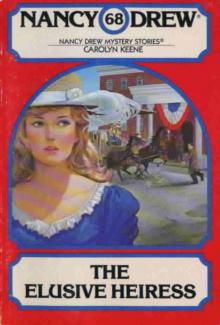 The Elusive Heiress
The Elusive Heiress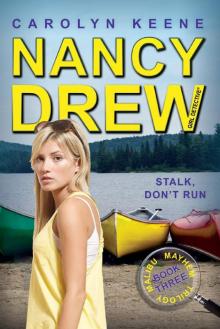 Stalk, Don't Run
Stalk, Don't Run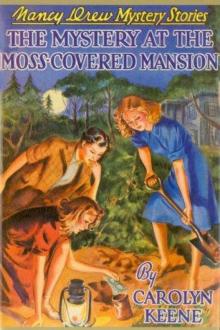 The Mystery at the Moss-Covered Mansion
The Mystery at the Moss-Covered Mansion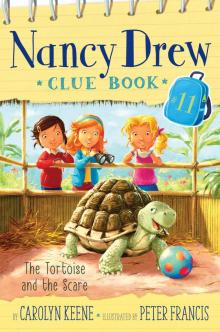 The Tortoise and the Scare
The Tortoise and the Scare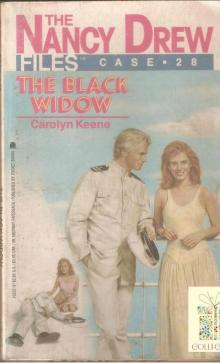 028 The Black Widow
028 The Black Widow Big Worry in Wonderland
Big Worry in Wonderland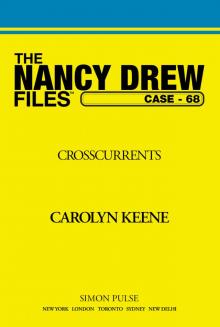 Crosscurrents
Crosscurrents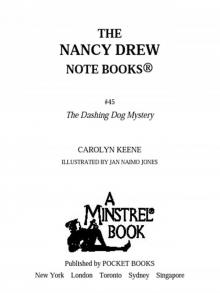 The Dashing Dog Mystery
The Dashing Dog Mystery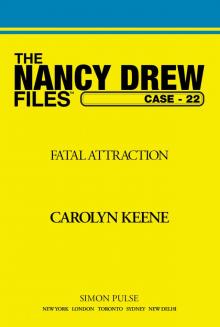 Fatal Attraction
Fatal Attraction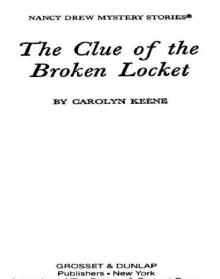 The Clue of the Broken Locket
The Clue of the Broken Locket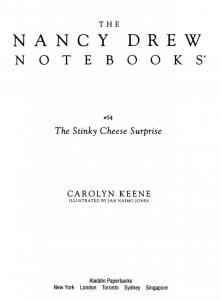 The Stinky Cheese Surprise
The Stinky Cheese Surprise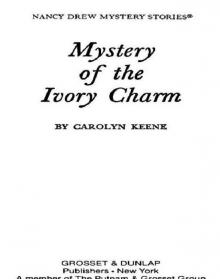 Mystery of the Ivory Charm
Mystery of the Ivory Charm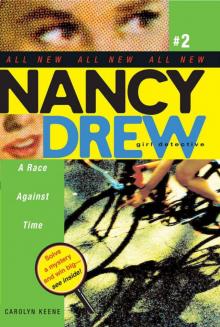 A Race Against Time
A Race Against Time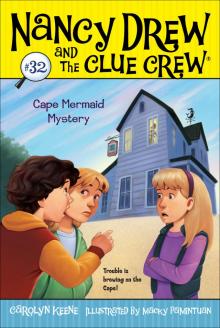 Cape Mermaid Mystery
Cape Mermaid Mystery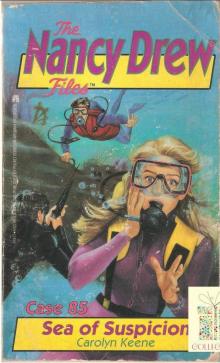 085 Sea of Suspicion
085 Sea of Suspicion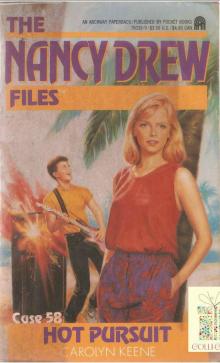 058 Hot Pursuit
058 Hot Pursuit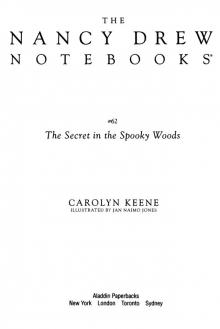 The Secret in the Spooky Woods
The Secret in the Spooky Woods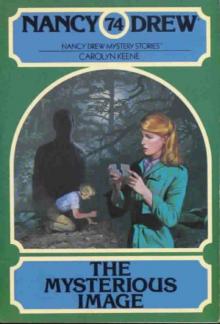 The Mysterious Image
The Mysterious Image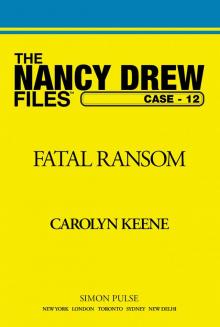 Fatal Ransom
Fatal Ransom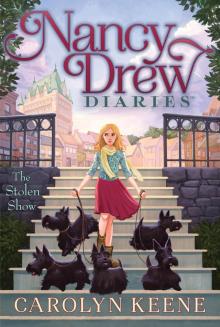 The Stolen Show
The Stolen Show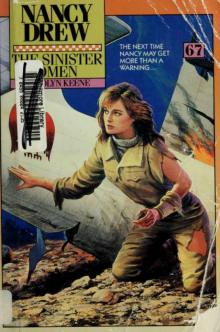 The Sinister Omen
The Sinister Omen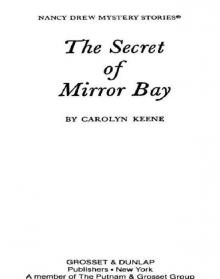 The Secret of Mirror Bay
The Secret of Mirror Bay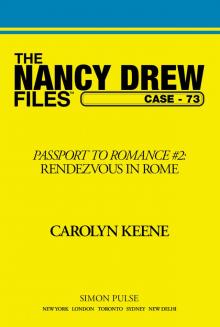 Rendezvous in Rome
Rendezvous in Rome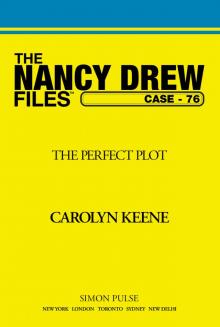 The Perfect Plot
The Perfect Plot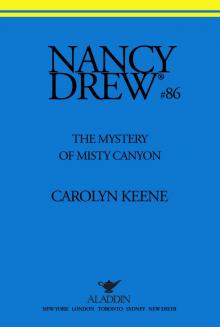 The Mystery of Misty Canyon
The Mystery of Misty Canyon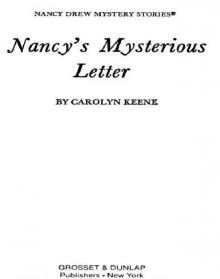 Nancy's Mysterious Letter
Nancy's Mysterious Letter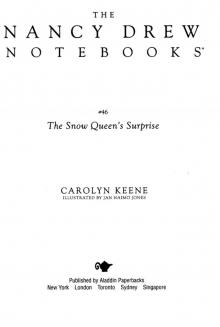 The Snow Queen's Surprise
The Snow Queen's Surprise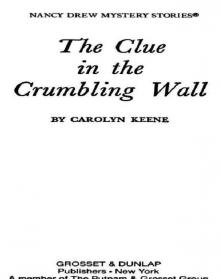 The Clue in the Crumbling Wall
The Clue in the Crumbling Wall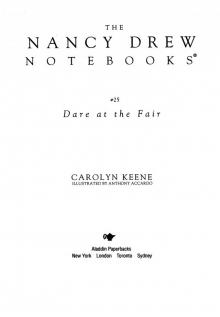 Dare at the Fair
Dare at the Fair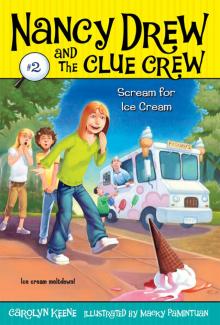 Scream for Ice Cream
Scream for Ice Cream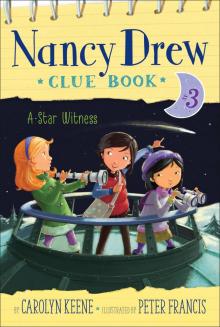 A Star Witness
A Star Witness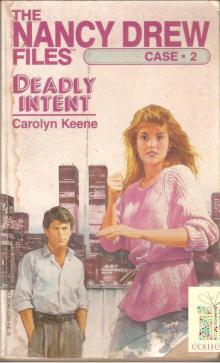 002 Deadly Intent
002 Deadly Intent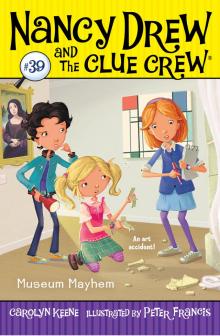 Museum Mayhem
Museum Mayhem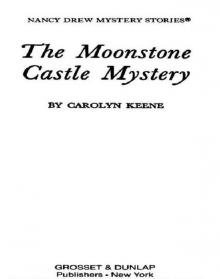 The Moonstone Castle Mystery
The Moonstone Castle Mystery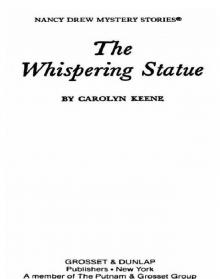 The Whispering Statue
The Whispering Statue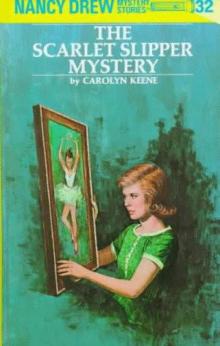 The Scarlet Slipper Mystery
The Scarlet Slipper Mystery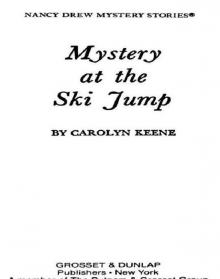 Mystery at the Ski Jump
Mystery at the Ski Jump Hot Pursuit
Hot Pursuit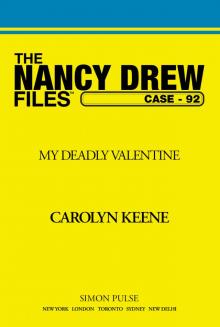 My Deadly Valentine
My Deadly Valentine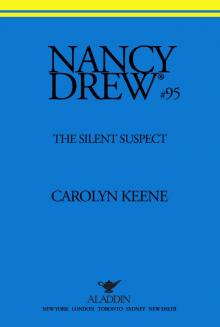 The Silent Suspect
The Silent Suspect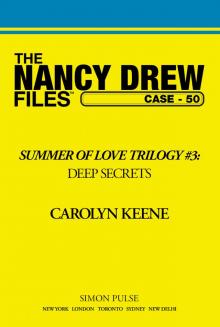 Deep Secrets
Deep Secrets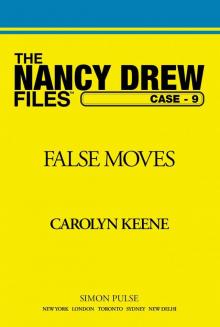 False Moves
False Moves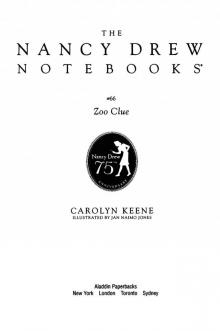 The Zoo Crew
The Zoo Crew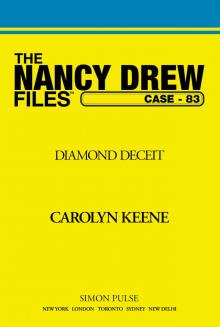 Diamond Deceit
Diamond Deceit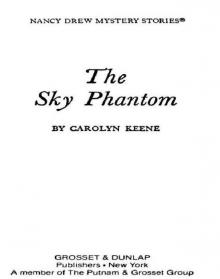 The Sky Phantom
The Sky Phantom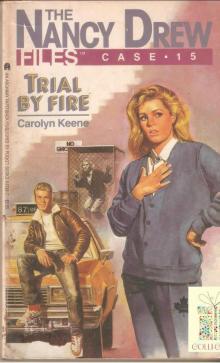 015 Trial by Fire
015 Trial by Fire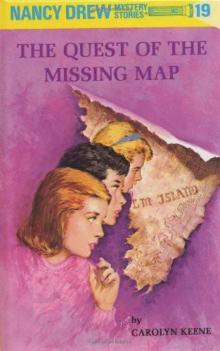 The Quest of the Missing Map
The Quest of the Missing Map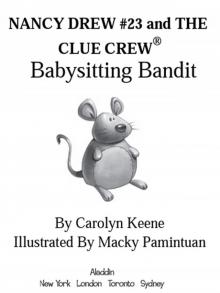 Babysitting Bandit
Babysitting Bandit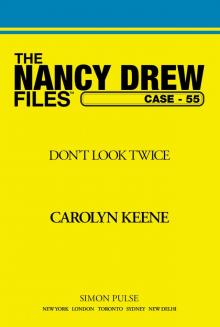 Don't Look Twice
Don't Look Twice Never Say Die
Never Say Die The Soccer Shoe Clue
The Soccer Shoe Clue Pool Party Puzzler
Pool Party Puzzler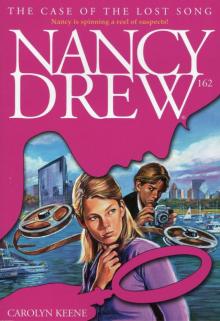 The Case of the Lost Song
The Case of the Lost Song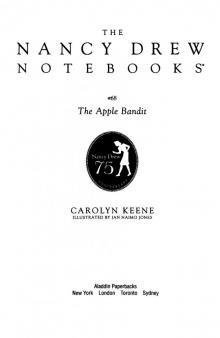 The Apple Bandit
The Apple Bandit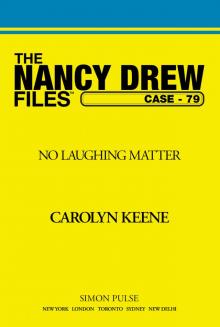 No Laughing Matter
No Laughing Matter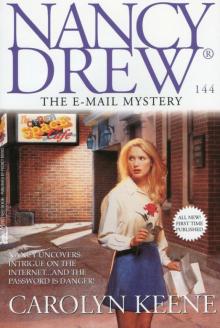 The Thirteenth Pearl
The Thirteenth Pearl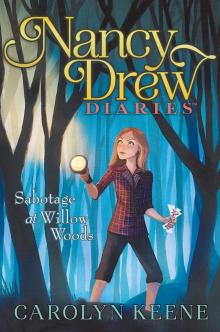 Sabotage at Willow Woods
Sabotage at Willow Woods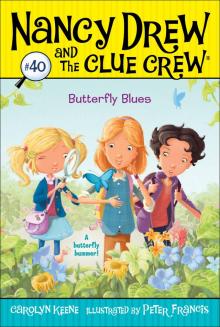 Butterfly Blues
Butterfly Blues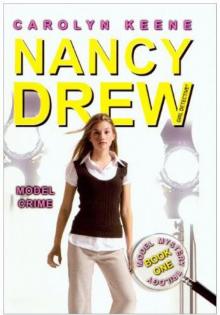 Model Crime 1
Model Crime 1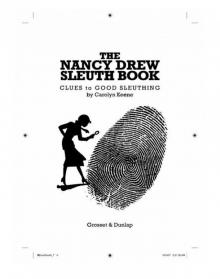 The Nancy Drew Sleuth Book
The Nancy Drew Sleuth Book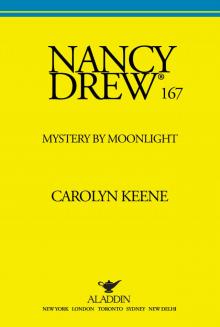 Mystery by Moonlight
Mystery by Moonlight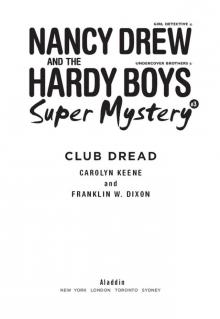 Club Dread
Club Dread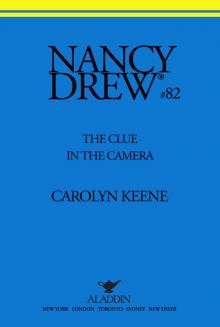 The Clue in the Camera
The Clue in the Camera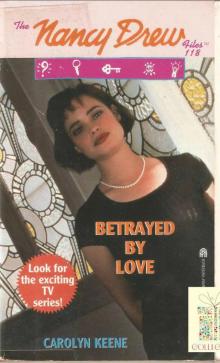 118 Betrayed By Love
118 Betrayed By Love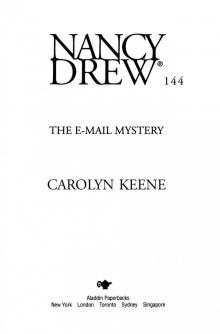 The E-Mail Mystery (Nancy Drew Book 144)
The E-Mail Mystery (Nancy Drew Book 144)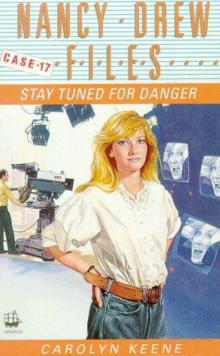 Stay Tuned for Danger: Circle of Evil
Stay Tuned for Danger: Circle of Evil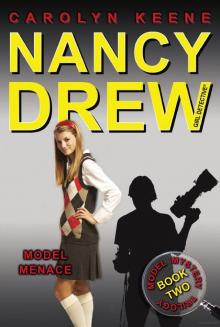 Model Menace 2
Model Menace 2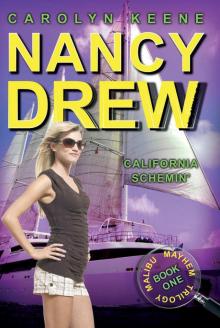 California Schemin': Book One in the Malibu Mayhem Trilogy
California Schemin': Book One in the Malibu Mayhem Trilogy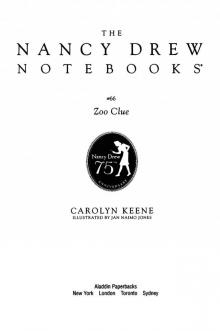 Zoo Clue (Nancy Drew Notebooks)
Zoo Clue (Nancy Drew Notebooks)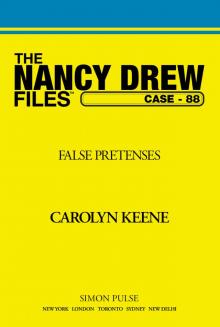 False Pretences
False Pretences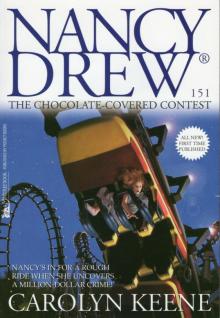 151 The Chocolate-Covered Contest
151 The Chocolate-Covered Contest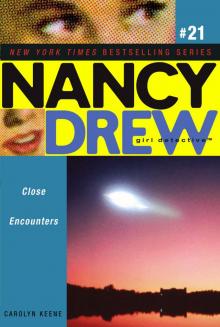 Close Encounters
Close Encounters The Emeral-Eyed Cat Mystery
The Emeral-Eyed Cat Mystery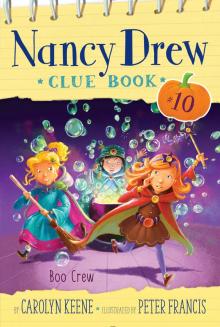 Boo Crew
Boo Crew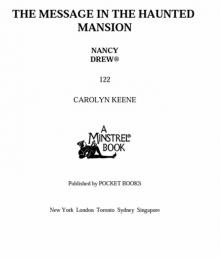 The Message in the Haunted Mansion (Nancy Drew Book 122)
The Message in the Haunted Mansion (Nancy Drew Book 122)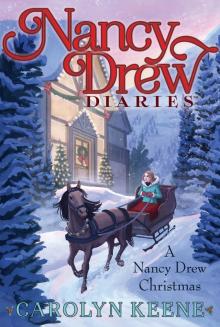 A Nancy Drew Christmas
A Nancy Drew Christmas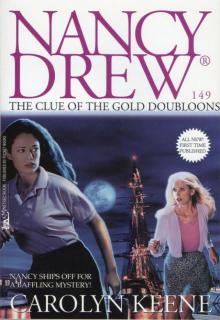 149 The Clue Of The Gold Doubloons
149 The Clue Of The Gold Doubloons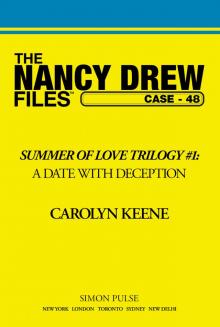 A Date with Deception
A Date with Deception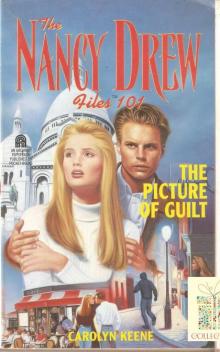 101 The Picture of Guilt
101 The Picture of Guilt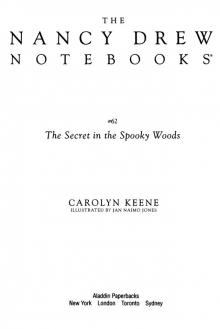 The Secret in the Spooky Woods (Nancy Drew Notebooks Book 62)
The Secret in the Spooky Woods (Nancy Drew Notebooks Book 62)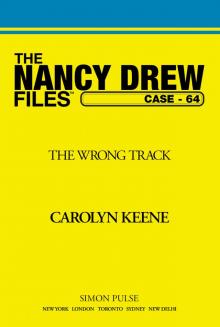 The Wrong Track
The Wrong Track Lights! Camera! Clues!
Lights! Camera! Clues!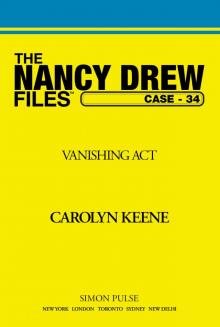 The Vanishing Act
The Vanishing Act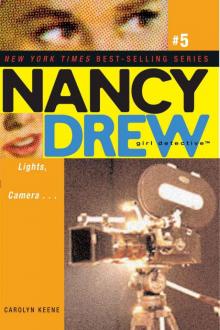 Lights, Camera . . .
Lights, Camera . . .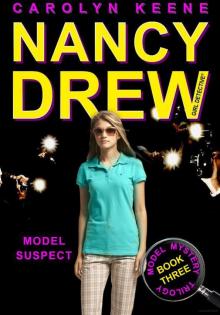 Model Suspect 3
Model Suspect 3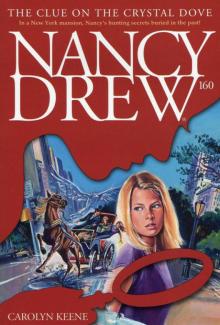 160 The Clue On The Crystal Dove
160 The Clue On The Crystal Dove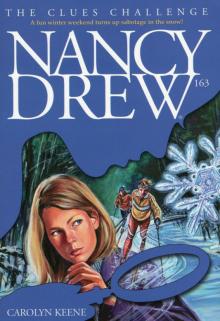 163 The Clues Challenge
163 The Clues Challenge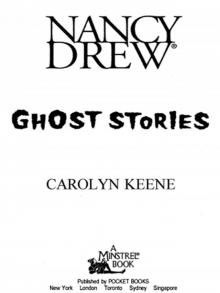 Ghost Stories (Nancy Drew)
Ghost Stories (Nancy Drew)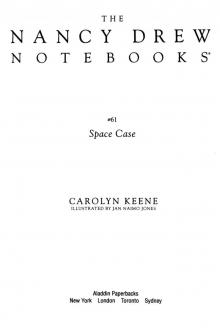 Space Case (Nancy Drew Notebooks Book 61)
Space Case (Nancy Drew Notebooks Book 61)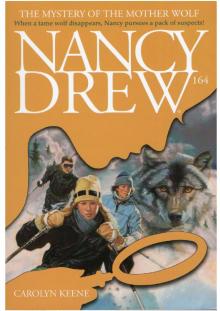 164 The Mystery Of The Mother Wolf
164 The Mystery Of The Mother Wolf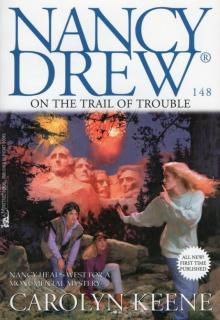 148 On The Trail Of Trouble
148 On The Trail Of Trouble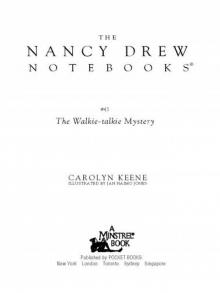 The Walkie-Talkie Mystery
The Walkie-Talkie Mystery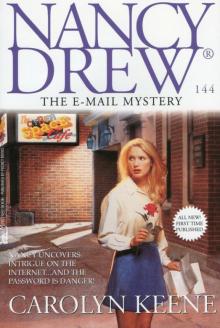 The E-Mail Mystery
The E-Mail Mystery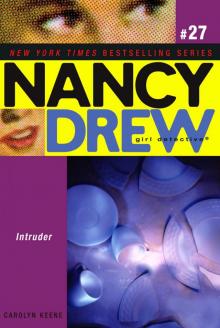 Intruder (Nancy Drew (All New) Girl Detective)
Intruder (Nancy Drew (All New) Girl Detective)![The Stolen Relic [Nancy Drew Girl Detective 007] Read online](http://i1.bookreadfree.com/i2/04/11/the_stolen_relic_nancy_drew_girl_detective_007_preview.jpg) The Stolen Relic [Nancy Drew Girl Detective 007]
The Stolen Relic [Nancy Drew Girl Detective 007]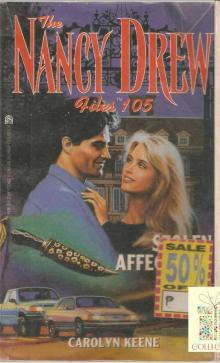 105 Stolen Affections
105 Stolen Affections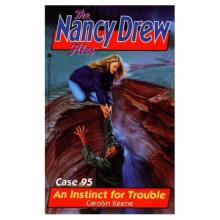 An Instict for Trouble
An Instict for Trouble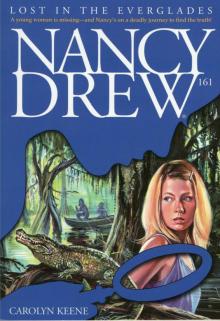 161 Lost In The Everglades
161 Lost In The Everglades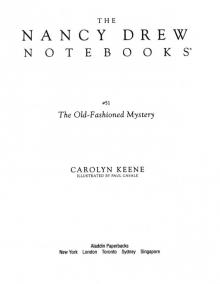 The Old-Fashioned Mystery
The Old-Fashioned Mystery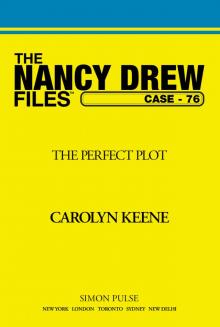 Perfect Plot
Perfect Plot